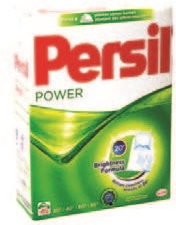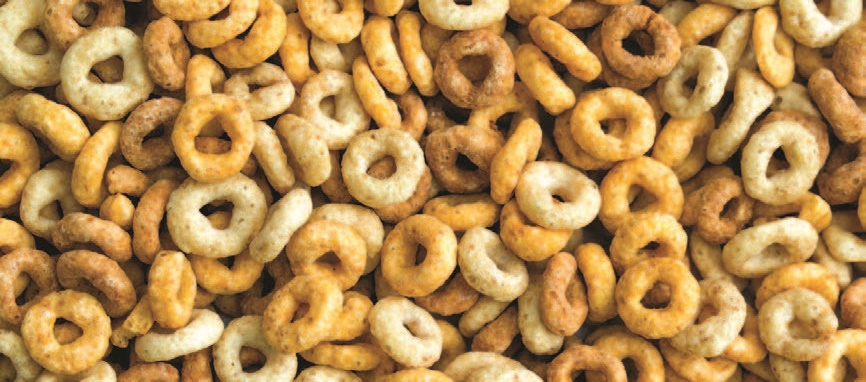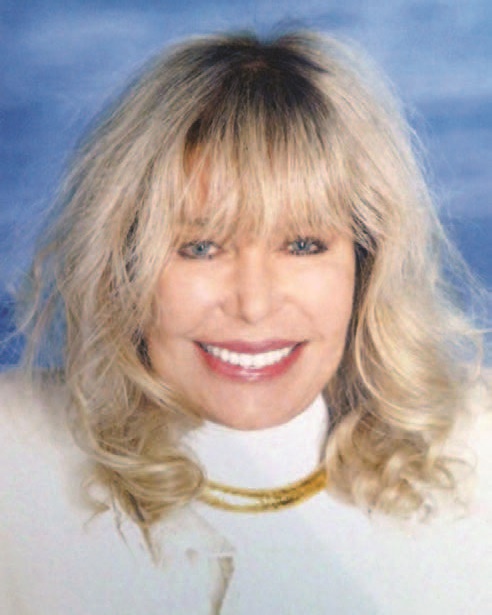
Joanna Gorczyca, MSW, MPA, LNHA Administrator/Director of Senior Services
FIVE STARS FOR BROTHER BONAVENTURE
While “shopping” for a nursing home for a loved one, consumers are likely to be impressed by Brother Bonaventure’s five-star rating on the Nursing Home Compare page on the Medicare website. Compared to other nursing homes, “Brother B” scored higher in health inspections, staffing and most importantly, quality of resident care. Joanna Gorczyca, MSW, MPA, LNHA Administrator/Director of Senior Services, who works tirelessly to maintain order and quality of care, says, “It’s something we’re very proud of and we’re going to work hard to keep it.”

Max Loeffler, founder and creator of Bumbles Dolls, right
BUMBLE DOLLS FOR ALL
Max Loeffler, founder, and creator of Bumbles Dolls, recently donated 100 dolls to the children inpatients at Trinitas. The following week, his sister Natasha Loeffler, brought 100 more to the Cancer Center and the Connie Dwyer Breast Center for patients. Loeffler, whose mother Vanessa Loeffler, the wife of Dr. Abu Alam, is the founder of the Teddy Bear Foundation for Achondroplasia. Loeffler’s daughter Theodora, was born with achondroplasia, a hereditary, congenital form of skeletal dysplasia commonly known as dwarfism. As Max watched medical professionals take care of his sister and began volunteering at a local hospital, he was inspired to help make a difference in a bigger way. And soon, Bumble Dolls were born and have made their way around the country. Now, we’re lucky to have them at Trinitas.

Geraldine Cruz, Palliative Care Director
NURSE OF THE YEAR
Congratulations to Geraldine Cruz, Palliative Care Director, who won Nurse of the Year in the category of Adult Health recently at the NJ March of Dimes Nurse of the Year Awards.

Nancy DiLiegro, PhD, FACHE Vice President of Clinical Operations and Physician Services, Chief Clinical Officer
SENIOR CAREERIST AWARD-WINNER
Congratulations to Nancy DiLiegro, PhD, FACHE Vice President of Clinical Operations and Physician Services, Chief Clinical Officer, the recipient of the 2020 Senior Careerist Award. She was honored by The New Jersey American College of Healthcare Executives Regent Advisory Council Awards Committee at the Annual Regent’s Breakfast and Awards Program on January 31, 2020, at the Hyatt Regency Princeton.
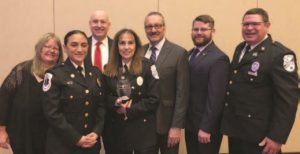
Trinitas EMS, Dr. Raffee Matossian, EMS Medical Director
MOBILE HEALTHCARE PROGRAM OF THE YEAR
Trinitas EMS was awarded the 2019 “Mobile Healthcare Program of the Year” award at the 20th Annual EMS Awards Program recently during the National Conference on EMS in Atlantic City. Dr. Raffee Matossian, EMS Medical Director, accepted the award from Deputy Commissioner of Health Christopher Neuwirth.
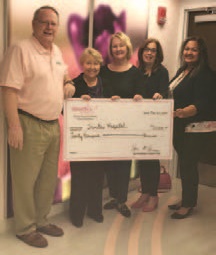
Minette’s Angels, the Connie Dwyer Breast Center
ANGELS AMONG US
Minette’s Angels, a non-profit foundation dedicated to funding efforts to provide programs and services to breast cancer patients, came to the Connie Dwyer Breast Center at Trinitas to make another generous donation to support our efforts.
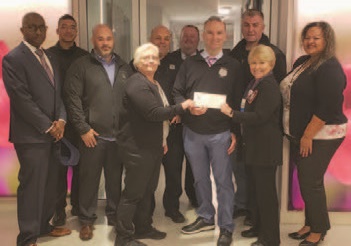
Elizabeth Police Department PBA, Local 4
PINK LIVES MATTER
Our friends at the Elizabeth Police Department PBA Local 4 came up with a creative way to support Trinitas. For Breast Cancer Awareness Month, they made fancy patches with a pink border and sold 400 of them to the public for $5 each. During the two-day, sold-out sale, they collected $2,000 and donated it for breast cancer patients at Trinitas. Thank you to our local heroes in blue for incorporating some pink!
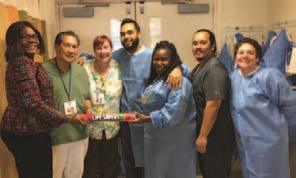
Trinitas Regional Medical Center Dialysis Employees
#GIVINGTUESDAY
Trinitas Regional Medical Center saves lives EVERY SINGLE DAY and on Tuesday, December 3, 2019, our Trinitas family raised more than $29,000 for #GivingTuesday. Thank you to all of our LIFESAVERS who donated this #GivingTuesday to benefit our behavioral health patients. We are so thankful for our generous employees, board members, and friends who are all helping us provide life-saving care to everyone who needs us. We appreciate YOU!

Renovated Classroom
PEACE OF MIND CAMPAIGN
Renovations to our Behavioral Health facilities are underway thanks to a very successful $4.6 million Peace of Mind Campaign. While patient rooms, group rooms, and hallways are being transformed into bright and cheerful spaces, we need to fill them with the right furniture and equipment for our patients! Help us fulfill their wish list by making a gift at www.trinitasrmc.org/POM
$ 50 Educational and media resources such as workbooks, books,

Renovated Bedroom
videos, bibles
$100 Chairs for group activity rooms
$250 Tablet/iPad for job training, educational games, and stress management apps
$500 Table for group rooms
$1,000 Wheelchair/medical transport chair for non-ambulatory or bed-bound patients
$3,000 Specialized behavioral health hospital beds
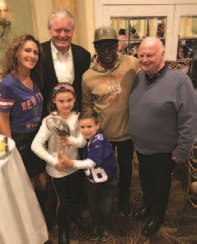
Bart Oates (Former New York Giants Player), Stephen Baker (Former New York Giants Player), and Gary S. Horan (President & CEO, Trinitas Regional Medical Center) with Mr. Horan’s daughter and grandchildren.
TAILGATE WITH TRINITAS
On Sunday, November 24, more than 80 guests gathered at Galloping Hill Caterers in Union to watch the New York Giants take on the Chicago Bears. They cheered on the Giants and although the Giants didn’t take home a win, Trinitas did! You helped us raise over $35,000 in net proceeds!
The afternoon also included football trivia, box pools, and raffle fun. Thank you to everyone who supported this year’s Tailgate with Trinitas event; you are the real MVPs! And a special thank you to our event chairs; Mitch Grossman and Jean McAllister.
Save the Date!
20TH ANNIVERSARY GALA
Thursday, May 14, 2020
The Venetian – Garfield, NJ
For more information on events, please contact Kim Boyer, Director of Operations at (908) 994-8249 or kboyer@trinitas.org.
In 2020, that’s a question worth asking when you make choices that involve environmental impact and sustainability. Here are four bright ideas that could improve the odds for the blue marble we call home…
WINNING UGLY

Misfits Market
Tired of overpaying for organic, non-GMO produce? Annoyed that—in a state where food stress and food deserts are real issues—more than a third of fruits and vegetables grown for your store end up in the dumpster because they are “imperfect” in some way? Too big, too small, shaped like a space alien—or too expensive for anyone to buy in the produce aisle. Misfits Market is one of several companies looking to narrow the waste factor by bringing quality food to your door. A box of “ugly” just-picked fruit and vegetables averaging 20 pounds will set you back $35 including shipping—so a good thing for the planet and a relative bargain. There are other options (and smaller sizes), plus you can stage deliveries so you never have too much, or run out. Each shipment comes in an eco-friendly box and contains a mix of leafy greens, vegetables, and fruit. And Misfits often throws in something new and wonderful you might not encounter unless you find it at an upscale eatery.
SOMETHING IN THE AIR

Watergen
The drinking water that comes out of your home tap has been in the news a lot lately, and not for good reasons. New Jersey is one of those states that keeps popping up on lists we don’t want to be on. There are filters you can screw onto your kitchen faucet and filtered pitchers you can keep in the fridge. Many people opt for home delivery of expensive and cumbersome jugs of filtered water. These solutions are all less than perfect. Watergen, an Israeli company that knows from water solutions, is rolling out a machine it calls GENNY. It pulls moisture out of the air—in your home, your office, wherever—and purifies both the water it dispenses and the air it pumps back into the room. The technology, which has a thumbs-up from the EPA, has also got the World Health Organization excited. GENNY dispenses premium-quality hot and cold water, doubles as a dehumidifier and can be controlled if you like with a smartphone app.
SPECIAL DELIVERY
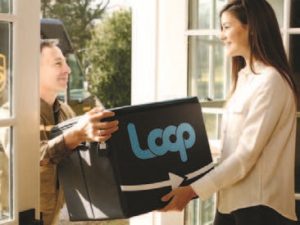
TerraCycle
The issue of single-use waste—what some of us call the “packaging problem”—has become overwhelming for a lot of consumers. You try to recycle as much as possible and maybe use some of the big boxes for storage, but end up throwing away a huge percentage of the stuff that other stuff comes in. A company right here in New Jersey, Trenton-based TerraCycle, has made strides in alleviating this problem, which impacts our homes and, obviously, the environment. Loop is a line of durable and reusable packaging and containers made largely of upcycled materials that you send back to the company when you’re done with its contents. It might be a detergent container or a juice bottle or the little box deodorant or toothpaste comes in. TerraCycle cleans it up and puts it right back into circulation. Among the corporations that have already “in the Loop” are Procter & Gamble, Nestle, and Unilever. Consumers pay a refundable deposit to get in on the program.
SAFE AND SOUND

The Container Store
As single-use plastic bags disappear from supermarkets and other retail stores, you can bet environ-mentalists will take aim next at disposable food-storage bags. As well they should. Most end up in a landfill or, in increasing numbers, the ocean. Which is why the reusable silicone bag is finally catching on. They’ve been around for a while and there are at least a dozen companies making them around the world. But Stasher may be the product to watch in 2020. The product was developed by Berkeley grad and plastic-free pioneer Kat Nouri a couple of years ago and got a boost from Mark Cuban on an episode of Shark Tank. Stasher reusable, airtight microwave-safe bags are made from “platinum-grade” silicone with no chemicals (e.g. BPA), fillers or petroleum byproducts and can be heated without leaching harmful toxins. An added benefit is that Stasher is ideal for sous vide slow-cooking.
To learn more about these products, visit these web sites:
- misfitsmarket.com • terracycle.com
- watergen.com • stasherbag.com
By Jim Sawyer
Eureka Moments are few and far between in the world of medicine. Typically, they come at the tail-end of years of research and rigorous testing and re-testing—at which point one of two things happens: They become headline-making stories or, more often, trickle out to the medical community and go almost completely unnoticed by regular people.
Among the stories that deserved a little more ink in 2019 were advances in immunotherapy, chemotherapy, inflammatory diseases, nanotechnology, and the common cold. Whether they lead to game-changing drugs or therapies, well, perhaps it’s too early to say. But they are definitely stories worth following in 2020 and beyond.
Immunotherapy: Not Just for Cancer Anymore

Mohammad2018
The immune system plays a role in the function of every organ and in a variety of health conditions. In 2019, researchers began a concerted effort to explore the benefits of immunotherapy—which is transforming cancer care—beyond the realm of oncology. Studies are currently being conducted to determine other ways in which stimulating the body’s immune system might prevent tissue rejection in transplant patients, as well as combating autoimmune diseases. Dermatologists at Penn Medicine have begun human trials using re-engineered T-cells to treat a skin disease called pemphigus. A pemphigus sufferer’s immune system produces antibodies that fight the proteins that hold the skin together, which causes painful blistering. The strategy is to “teach” the T-cells to go after the immune cells that make the antibodies. Previously, researchers had focused on neutralizing the antibodies, without much success.
The Common Cold: On the Endangered List?

Shutterstock
In 2019, biologists at Stanford University reported finding the source of a protein essential to the function of numerous enteroviruses—which include the rhinoviruses we call the common cold. In human cells, enteroviruses cannot replicate without this particular protein—sort of like a copier with no paper left in its tray. The work at Stanford paves the way for antivirals that will cure most cases of the common cold, and also sheds light on how viruses use a host’s cell proteins to thrive. This, in turn, may impact other illnesses caused by enteroviruses—including those linked to heart inflammation and myelitis. The development of a drug that targets the protein in question is the next step. The hope is that it will do its job without being toxic to humans in some other way.

Jan Homann
It’s a Small World After All: New Nanolaser with Big Potential
Researchers at Northwestern and Columbia Universities recently developed a microscopic nanolaser that is about one-thousandth the thickness of a human hair. In theory, it is small enough to go inside living tissue and provide imaging for doctors without damaging the tissue (because it does not require UV light to operate). The nanolaser uses photon “upconversion,” a process in which low-energy, bio-friendly photons are absorbed and converted into a higher-energy, visible laser beam. The shorthand here is that the new nanolaser can safely produce biological imaging where current ones can’t—including inside the human brain, where it could detect disease biomarkers, or even treat deep-brain disorders, such as epilepsy.

Andy Bowen
Indivisible: Hair Loss Fix for Chemo Patients
One of the most distressing side effects of cancer treatments is total hair loss. Researchers at the University of Manchester (right) in England have been trying to understand why hair follicles respond so poorly to chemotherapy. In 2019, they announced a breakthrough. Focusing on the damage caused by taxanes—the family of cancer drugs that cause permanent hair loss—the scientists found that the specialized dividing cells at the base of hair follicles, which are critical for producing hair (and the stem cells that produce them) are especially vulnerable to taxanes. They tried a new class of drugs called CDK4/6 inhibitors, which halted cell division in the follicles. Moving forward, the hope is that a cream or ointment can be made that will suspend this cell division temporarily, during chemo. The work at Manchester may also open the door to a treatment that will restore hair in patients who have already undergone cancer treatment.
Clever Cleaver: Redefining “Strip Steak”

Jeremy Keith
The debate over the health effects of consuming red meat are likely to last as long as there are steaks sizzling on summer grills. Last October, yet another major study came out on the subject—this time finding there are no conclusive links between a red-meat diet and serious disease-causing most health professionals to lose their minds! Overlooked in the furor was a September news item out of UC-San Diego Medical School concerning Neu5Gc.

ChemDraw
It’s a carbohydrate made by most mammals (including cattle), but not by humans. Whenever you eat red meat, a little Neu5Gc is absorbed into your tissue and, as it builds up, your immune system attacks it. This is believed to be the reason why diets heavy in red meat are linked to chronic inflammation, which can trigger an array of serious medical conditions, including colon cancer and atherosclerosis. The scientists at UC San Diego have found that sialidases—a type of bacterial enzyme produced in the gut—have the ability to cleave Neu5Gc from human tissue. This is exciting because, taken a step further, sialidases could actually be used to “scrub” Neu5Gc out of red meat before it even gets off the fork. In studies done on humanized mice, a sialidase enzyme made by carbohydrate-loving bacteria was shown to get Neu5Gc off of cells. Researchers also exposed meat purchased from a grocery store to sialidase that was generated in the lab and found that most Neu5Gc came off of the meat. If all goes well, the goal is to create a probiotic (or prebiotic) that would reduce the risk of inflammatory diseases for lovers of burgers and steaks.
What Can Brown Do for You?

www.istockphoto.com
Although it doesn’t qualify as a medical breakthrough, a program called Flight Forward—which began a test run less than a year ago—promises to change the way many people receive life-saving medicine, supplies, and testing. The autonomous drone program was the brainchild of UPS and navigated enough obstacles to get the thumbs-up from the FAA for more extensive trials in 2020—flying tissue, urine and blood samples between a limited number of U.S. hospitals. UPS is not the first to try this; a company called Zipline has been delivering medical supplies via drone to remote villages in Ghana and Rwanda for a year.
In a few years, Meg Donnelly will look back on the early months of 2020 and wonder how she did it. Donnelly is currently filming Season 4 of the ABC sitcom American Housewife, opening Disney’s Zombies II on Valentine’s Day, and will be touring this March in support of Trust, the well-received album she dropped last December. It’s great to be 19, right? Donnelly got the musical comedy bug as a grade-schooler in New Jersey, and then fell in love with Broadway after her family moved to New York. She’s been singing, acting and dancing professionally since her ’tween years and at this point you’ve probably seen or heard her a hundred times without even knowing it. Start paying attention… Donnelly is not just a natural talent, she is a force of nature. EDGE editor Mark Stewart caught Donnelly before she revved up her day in L.A.
EDGE: At what point did your professional training begin?

ABC Studios
MD: I went to a school called Annie’s Playhouse in Far Hills starting when I was five or six. Originally I went there to do shows for fun, because I was bad at sports and had to find something to do after school. I would go there, like, every night and watch all the older kids in class. That’s where I fell in love with performing. I just couldn’t see myself doing anything else, musical theater is so big in the NewYork– New Jersey area, so it was really cool to get into that. I was born in New York City and then my family moved to New Jersey, then moved back to the city when I was growing up. But I spent a lot of time in Jersey all the time, because of so many family members living there—in Hunterdon County, Somerset County and Morris County—all over the place. It was fun to visit them and visit old friends, too. I love New Jersey. It’s the best.
EDGE: Did your parents take you to a lot of Broadway shows?
MD: I loved going to Broadway shows. In New York, I attended the Performing Children’s School. PCS was really fun. I was a huge theater kid. My favorite musical still is Rent. I saw it on Broadway the first time when I was five. I had no idea what was going on and I fell asleep at the end. Growing up, I would watch the movie every single day—long before I even grasped the concept of what it was about. I loved it.
EDGE: From what I’ve seen, you’d be very much in your element in a Broadway musical. I hope that’s on your radar.
MD: Oh, yeah. For sure. I would like to do theater. Acting is so amazing and singing is so amazing, so I’d love to combine all three.
EDGE: You started shooting the fourth season of American Housewife in January, playingTaylor Otto, the family’s teenage daughter. How has that role evolved?
MD: In the first season, Taylor was an athlete playing three sports. I love watching sports so much…I just cannot play them. It was a challenge and it was fun— no matter what Taylor is or does, I love playing her—but I am so thankful that the writers threw in that she broke her ankle and couldn’t play anymore. She had to find a new activity and turned to theater. That was really cool. [laughs] I think Taylor has become a very relatable character for teenage girls everywhere and to parents, as well. She is a combination of all the writers’ teenage daughters, if that makes sense, so there are many situations with her mom and the things she says where parents who watch American Housewife say, “Oh… Yup…”

ABC Studios
EDGE: How do your experiences as teenagers differ?
MD: Taylor navigates through life a little more than I do. She’s in high school and about to go to college. Me, I was 11 and out of school auditioning. I didn’t have a normal life. So it’s hard to relate. But as teenagers and daughters, we have a lot of similarities, too.
EDGE: There are a lot of funny people on your show. Who cracks you up the easiest?
MD: I honestly would say Daniel [DiMaggio] who plays my younger brother, Oliver. Diedrich [Bader] and Katy [Mixon] are constantly making jokes and they are so funny. Also, obviously Ali Wong. Her improvs are so funny. I don’t have that many scenes with her because she’s usually doing the “second breakfast” with Katy. I always talk with Ali outside of work. You know, it’s crazy how nice everybody is. You hear these horror stories in Hollywood and we’re, like, nothing of the sort. I pinch myself every day. And it’s not just the cast. The entire crew is like family. We know each other like the back of our hands because it’s been the same crew going on four years.
EDGE: There are never any guarantees that a network series will be picked up, of course. During your first season, did everyone feel like the show was going to make it?
MD: We did 13 episodes our first season and were hoping for more. I asked Diedrich, because he’s been around the block in this business and he’s like my second dad. He said, “There’s literally nothing you can do.You just have to wait it out.” Everyone was so happy when they announced we would get a full season. You pay attention to the ratings and all that, but in this day and age, you never know.
EDGE: In the Zombies films you’ve made for Disney, was that your first time playing the romantic lead?

Disney Canada
MD: In American Housewife, Taylor has boyfriends and stuff, but that’s not the equivalent. In Zombies that was the first time it was super-heavy romantic. It was so much fun, though, because Milo Manheim [who plays Zed, her zombie boyfriend] and I are, like, best friends. Especially doing the second movie, it’s so easy to go into a scene where we know exactly what we’re doing. The scenes are challenging, but the chemistry of romance is so natural now.
EDGE: Did you know Milo before Zombies?
MD: No. We met during the audition process. But we instantly trusted each other. It was the weirdest feeling. That’s why it ended up working out—we just had this connection, I don’t know how to describe it.
EDGE: How did the audition work?
MD: The process was interesting. First, you come in for the role. So there were three auditions of me going for [the lead role of] Addison. Then it was a chemistry read, where they’d pair you up with different guys. All the Zeds and Addisons would go in and they’d check the height and the look and see what was happening between the actors. Milo and I were paired up with different people at the beginning and it wasn’t until the end of the day that they put us together. When we were in the room, I don’t know what happened. Something clicked. Everyone kind of saw it and Milo and I saw it, too. We were just so comfortable and laughing at the same time. It was cool. So for the rest of the process they only paired us up, so we were a team. Once that happened, it was like, Which team will get it? It’s funny. In the final audition they asked if we could sing a duet. And I was like, ummmm… I started freaking out. But Milo being Milo, he said, “Give us two minutes.”
EDGE: And what happened?

Disney Canada
MD: We went outside the room and I asked, “What is your idea?” He said, “I don’t have an idea! I just started saying stuff!” We quickly decided we’d sing “Love Is an Open Door” from Frozen and, in two minutes, we got the harmonies down and made up some choreography. We went back in shaking—we were so nervous—but we just went for it.
EDGE: Addison is a cheerleader in Zombies. You mentioned that sports isn’t really your thing. Did you have to go through a lot training to play a cheerleader convincingly?
MD: It was cool because when I was little I had taken gymnastics. It started to come back, especially the tumbling stuff. But, yeah, there were four weeks of rehearsal and then six to seven weeks of shooting. So during rehearsal we had intense cheer training. We filmed in Toronto, so all these cheer teams from Canada would come in and teach us how to keep your elbows together when you clap, the proper way to position your arms and legs, it was really intense. But so much fun.
EDGE: You began making a splash as a recording artist in 2018. Now you have the album Trust, which came out near the end of 2019. How did that part of your life evolve?
MD: My whole life I’ve been writing down song lyrics and have always had melodies in my head. I didn’t know how the whole recording and producing part of the business worked, but it was always something I’d wanted to do. On the first Zombies movie, Ali D Theodore, the producer of the song “BAMM”—we actually went to the same high school, PCS in New York—said, “I really want you to come by my studio if you’re home.” A year later I was in New York, dropped by the studio, and it just kind of clicked. I started making music and that was that. He helped me navigate through the music world and I couldn’t be more grateful. My life has changed a lot since then—music is very therapeutic for me and it has always been such a big part of my life. Now I finally get to do another thing that I love.
 EDGE: Is there an entertainer you look at now and think, Yeah, she did it the right way—not an idol so much as an inspiration?
EDGE: Is there an entertainer you look at now and think, Yeah, she did it the right way—not an idol so much as an inspiration?
MD: I feel like Zendaya is such a good model. She gracefully and gradually went out of the Disney world and is doing stuff she loves. She’s on [the HBO series] Euphoria and she came out with music that’s really good. I feel like everything she does is poised and elegant, but you can tell she also has fun and is very authentic. She balances all of those qualities very well.
EDGE: At some point down the road, achieving that kind of balance might mean making decisions about pursuing dramatic roles or acting in comedies, or chasing a singing career. Are you thinking about those choices yet?
MD: Honestly, I’m down for anything. [laughs] I’m seeing where things take me, playing it by ear, staying ready for whatever comes my way. I do tend to overthink and plan out my whole schedule, but in this business you have no idea what’s going to happen. I could get a call tomorrow to be on a flight to Seattle and I’d be, Okay, great. Right now, I’m just grateful for every opportunity and excited for the future.
Swinging Into Spring
January 30 to March 1
Paper Mill Playhouse
(Check web site for show dates and times.)
Unmasked The Music of Andrew Lloyd Webber
 Unmasked is a new musical revue inspired by the recent autobiography of Andrew Lloyd Webber and featuring his most beloved songs and stories.
Unmasked is a new musical revue inspired by the recent autobiography of Andrew Lloyd Webber and featuring his most beloved songs and stories.
February 21 – February 29
Kean Stage
(Check web site for show dates and times.)

Kean Stage
Anna In the Tropics
Pulitzer Prize winner Nilo Cruz wrote this play about a Cuban-America family awaiting an important visitor.

NJPAC
Tuesday • February 25 7:00 pm
NJPAC
PHILADANCO!
The electrifying dance company celebrates its 50th anniversary on the Victoria Theater stage.

State Theatre of New Jersey
Saturday • March 14 2:00 & 8:00 pm
State Theatre
Russian National Ballet
The Sleeping Beauty
All the way from Moscow, the RNB performs Tchaikovsky’s magical fairy tale.
 Saturday • March 21 • 7:30 pm
Saturday • March 21 • 7:30 pm
Kean Stage
Taylor 2 Dance Company Live On Stage
Renowned choreographer Paul Taylor established “Taylor 2” in 1993. The company captures the athleticism, humor and range of emotions for which his work is known.

NJPAC
Saturday • March 21 • 7:30 pm
Sunday • March 22 • 3:00 pm
NJPAC
Ballet Hispanico Carmen Maquia
The timeless story of Carmen is interpreted through a unique fusion of ballet, paso doble, flamenco and contemporary dance.

State Theatre of New Jersey
Tuesday • March 31 • 8:00 pm
State Theatre
Complexions
Contemporary Ballet Bach 25 and Star Dust
Founded in 1994 by master choreographer Dwight Rhoden and the legendary Desmond Richardson, Complexions presents dance celebrations of the classical master and rock legend David Bowie.
April 1 to April 26
Paper Mill Playhouse
(Check web site for show dates and times.)
Sister Act
A feel-good musical based on the Hollywood hit, Sister Act earned five Tony nominations during its Broadway run.

State Theatre of New Jersey
April 2-4
State Theatre
(Check web site for show dates and times.)
The Play That Goes Wrong
The State stages four performances of the Broadway hit that turns a murder mystery into a gut-busting comedy.

NJPAC
April 23 to April 29
NJPAC
(Check web site for show dates and times.)
Shen Yun
The world-famous classical Chinese music and dance company returns to NJPAC for eight spellbinding performances.
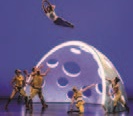
State Theatre of New Jersey
Tuesday • April 28 • 8:00 pm
State Theatre
Diavolo Live On Stage
The high-flying America’s Got Talent finalists have blended modern dance with acrobatics and gymnastics to create an awe-inspiring show.
POPULAR

State Theatre of New Jersey
Thursday • February 13 8:00 pm
State Theatre
Boyz II Men Live On Stage
R&B icons Boyz II Men get a jump on Valentine’s weekend with a big show in New Brunswick. The group has sold more than 60 million albums.

Prudential Center
Friday • February 14 • 8:00 pm
Prudential Center
Bell Biv DeVoe & Friends A Night of Love
Fantasia, Keyshia Cole, Monica and XSCAP3 join 1990s R&B icons Bell Biv DeVoe for an unforgettable Valentine’s Evening celebration.

Prudential Center
Saturday • February 15 • 8:00 pm
Prudential Center
Marc Anthony The Opus Tour
Singer-actor-producer Marc Anthony brings his Opus Tour to Newark for a Saturday night spectacular. Anthony is a two-time Grammy winner and has sold more than 12 million albums worldwide.
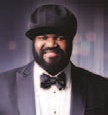
NJPAC
Sunday • February 16 • 7:00 pm
NJPAC
Gregory Porter & Ledisi Live On Stage
Gregory Porter, the Grammy-winning man in the Kangol hat, teams up with Selma star Ledisi for an evening of jazz in Prudential Hall.

Prudential Center
Thursday • February 18 • 8:00 pm
Prudential Center
Post Malone The Runaway Tour
Post Malone has extended his Runaway Tour and will play The Rock this winter, along with Swae Lee and Tyla Yaweh. Malone’s blend of hip-hop, rap and rock has sold 60 million records.

Prudential Center
Saturday • March 7 • 7:30 pm
Sunday • March 8 • 7:30 pm
Prudential Center
Celine Dion Courage World Tour
Celine Dion takes the stage for two-weekend shows in her first U.S. tour in a decade. Dion has sold more than a quarter-billion albums in her 35-year career.

NJPAC
Saturday • March 14 2:00 & 7:00 pm
NJPAC
Valerie Simpson with Dave Koz Sugar Bar Comes to Newark
Valerie Simpson and saxophonist Dave Koz team up to recreate the timeless ambiance of the NYC nightspot owned by Simpson and the late Nickolas Ashford (aka Ashford & Simpson).

NJPAC
Saturday • March 14 • 3:00 pm
NJPAC
Michael Feinstein Shaken & Stirred
Legendary pianist Michael Feinstein and vocalist Storm Large present an afternoon of intoxicating music from the Great American Songbook.

MTV International
Monday • March 16 • 7:30 pm
Prudential Center
Billie Eilish Where Do We Go? World Tour
Teen sensation Billie Eilish’s debut album When We Fall Asleep, Where Do We Go? absolutely blew up in 2019, producing four platinum singles. She is the first artist born in the 2000s to chart a #1 hit, with “Bad Guy.”
Tuesday • March 17 • 8:00 pm
State Theatre
Celtic Women Celebration
Celebrate St. Patrick’s Day with Tara McNeill on fiddle and Irish harp, and singers Mairéad Carlin, Éabha McMahon, and Megan Walsh.

NJPAC
Friday • March 20 • 8:00 pm
NJPAC
Johnny Mathis Live On Stage
Legendary hit-maker Johnny Mathis is joined on the Prudential Hall stage by special guest Gary Mule Deer. Chances are it’ll be a night to remember.
Saturday • March 21 • 7:00 pm
State Theatre
Jay & The Americans Golden Oldies Spectacular
Relive the 1960s with Jay, BJ Thomas, Lou Christie, Dennis Tufano of The Buckinghams, and 1919 Fruitgum Company.
Sunday • March 22 • 6:30 pm
Prudential Center
Omarion & Bow Wow The Millennium Tour 2020
The two legendary artists are joined by Sammie, Pretty Ricky, Ying Yang Twins and Soulja Boy in a rap extravaganza at The Rock.
Friday • April 3 • 8:00 pm
NJPAC
The Beach Boys 12 Sides of Summer
The iconic rock group has been on the road performing their hits for more than a half-century. Felix Cavaliere’s Rascals join the good vibrations on the Prudential Hall stage.

Ernst Vikne
Wednesday • April 15 • 8:00 pm
Prudential Center
Elton John The Farewell Yellow Brick Road Tour
Elton John sold out his 2019 shows in Newark and is returning for one more on his final world tour. His album sales are currently 300 million and counting.
FOR THE KIDS
 February 27 – March 1
February 27 – March 1
Prudential Center
(Check web site for show dates and times.)
Jurassic World Live Tour
A jaw-dropping stage show featuring life-sized Jurassic Park dinosaurs lumbers into the Prudential Center for nine unforgettable performances.
Saturday • March 7 10:00 am & 12:00 pm
State Theatre

State Theatre of New Jersey
Princeton Percussion Ensemble Milk & Cookies
The Princeton Symphony Orchestra Bravo Percussion Ensemble presents a fun, interactive, and educational program for the young ones.

NJPAC
Sunday • March 8 • 4:00 pm
NJPAC
National Dance Institute Voices of Change
What could be more fun or inspiring than kids dancing for kids? Two hundred student dancers highlight a Sunday afternoon performance on the Victoria Theater stage.

NJPAC
Sunday • March 8 • 7:00 pm
State Theatre
Tuesday • March 10 • 7:00 pm
NJPAC
MasterChef Junior Live On Stage
The beloved cooking competition come to New Jersey in a show featuring some of the show’s all-time favorite contestants.

State Theatre of New Jersey
Sunday • March 15 11:00 am & 2:00 pm
State Theatre
Dinosaur World Live
This interactive show features lifelike dinosaurs including T-Rex, Triceratops and Segnosaurus.

State Theatre of New Jersey
April 10–13
State Theatre
(Check web site for show dates and times.)
Sesame Street Live Let’s Party!
It’s a street party at the State Theatre featuring Big Bird, Elmo, Cookie, Oscar, Abby and Grover.

Recycled Percussion
Friday • April 24 • 7:00 pm
NJPAC
Recycled Percussion
The drummers of Recycled Percussion transform everyday objects into percussive instruments during a high-energy, family-friendly show.
Laugh Out Loud
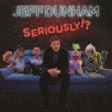
Prudential Center
Thursday • February 6 • 7:00 pm
Prudential Center
Jeff Dunham The Seriously? Tour
Jeff Dunham has found the sweet spot between stand-up and ventriloquism during a career that stretches back to his Broadway breakthrough in the 1980s. Dunham is bringing all his buddies to The Rock, including Walter, Peanut, Bubba J and Sweet Daddy Dee.

NJPAC
Saturday • February 22 • 7:00 pm
NJPAC
Yvonne Orji Lagos to Laurel Tour
The star of HBO’s Insecure brings her hilarious take on faith and family to the Victoria Theater.

Maz Jobrani
Friday • March 6 • 7:30 & 9:00 pm
NJPAC
Maz Jobrani Live On Stage
A Netflix and NPR favorite, Maz Jobrani brings his unique spin on the Iranian-American experience to Newark. Check out our Q&A with Maz on the edgemagonline.com “Interviews” tab.

State Theatre of New Jersey
Thursday • March 12 8:00 pm
State Theatre
Jay Leno Live On Stage
One of the all-time great stand-ups makes a stop in New Brunswick.
Friday • April 4 • 7:00 pm
NJPAC
Kathleen Madigan 8 O’clock Happy Hour Tour
The beloved stand-up presents an uncensored and no-holds-barred evening that begins an hour before 8 o’clock.

NJPAC
Friday • April 17 • 8:00 pm
NJPAC
Rob Reiner This Is Spinal Tap
Spinal Tap director, writer, and co-star Rob Reiner comes to NJPAC to celebrate the 35th anniversary of his groundbreaking mockumentary about the loudest band in England.
Classical
Saturday • February 15 • 8:00 pm
State Theatre
Siberian State Symphony Orchestra
Vladimir Lande conducts and Pavel Milyukov is featured on the violin in a special stop in New Jersey during an eight-week U.S. tour.
Friday • February 21 • 8:00 pm
NJPAC
Beethoven, Paganini & Brahms Academy of St. Martin In the Fields
Conductor/violinist Joshua Bell—a Prudential Hall favorite—will solo on Paganini’s heartwarming Violin Concerto No. 1.
Thursday • Februrary 27 • 1:30 pm
Sunday • March 1 • 3:00 pm
NJPAC
Saturday • February 29 • 8:00 pm
State Theatre
New Jersey Symphony Orchestra
Simone Porter performs on violin and Christoph Konig conducts the NJSO performing the works of Mozart, Bruckner, and Mendelssohn.
Saturday • April 4 • 8:00 pm
NJPAC
Sunday • April 5 • 3:00 pm
State Theatre
New Jersey Symphony Orchestra Tchaikovsky’s Fifth Symphony
Conductor Henrik Nansi makes his NJSO debut after wowing fans at the Metropolitan Opera last season.
Saturday • April 18 • 7:30 pm
Kean Stage
Black Violin Impossible Tour
Though classically trained, Kev Marcus and Wil B. aren’t strictly a classical act. They bring their genre-bending talent to Kean U. for a stop on a highly anticipated spring/summer tour.
 For more info on these listings log onto the following web sites:
For more info on these listings log onto the following web sites:
Kean Stage • keanstage.com
NJPAC • njpac.org
Paper Mill Playhouse • papermill.org
Prudential Center • prucenter.com
State Theatre • stnj.org
Photo Credits:
NJPAC: Ballet Hispanico, PHILADANCO, Shen Yun, Gregory Porter, Michael Feinstein, Johnny Mathis, MasterChef Junior, National Dance Institute, Joshua Bell, Yvonne Orji, Henrik Nansi, Simone Porter ; State Theatre of New Jersey: Russian National Ballet, Complexions, The Play That Goes Wrong, Diavolo, Boyz II Men, Jay & The Americans, Princeton Percussion, Dinosaur World Live, Sesame Street Live, Jay Leon, Siberian State Orchestra; Kean Stage: Black Violin; Other: Elton John by Ernst Vikne; Rob Reiner by Jay Godwin; Billie Eilish courtesy of MTV International; Valerie Simpson courtesy of Hopsack & Silk Records; Bell Biv DeVoe courtesy of MCA Records; Taylor 2 by Whitney Browne; Recycled Percussion courtesy of Recycled Percussion; Maz Jobrani courtesy of Maz Jobrani
What happens when a game-changing product hits the market…and consumers just change the channel?
By Luke Sacher
Thomas Edison once said, “I can never pick something up without wanting to improve it.” The man who brought to millions the light bulb, phonograph and motion pictures embodied the spirit of invention and innovation as he churned out one culture-changing product after another. That same spirit is still alive and well today, driving an unprecedented wave of new, transformative consumer products and technologies.
It’s worth noting that Old Tom also laid more than a few bad eggs, some of which proved quite costly both to his investors and him personally. The electric pen, the spirit phone… who knows why they never caught on?

www.istockphoto.com
My point is that even when true geniuses are involved, and no matter how many hotshot business executives have green-lighted a product or how much money has been plowed into promoting it, there is no guarantee that people will buy what they are selling. And when they don’t, it’s a catastrophe.
I grew up in a family of Madison Avenue advertising executives. The ongoing conversation about marketing calamities—during meals, on car rides, and at the cocktail parties I was often allowed to stay up for—is a subject that still fascinates me. In my adult lifetime, I can think of more than a dozen “What were they thinking?” moments. Here are four you might remember, one you probably don’t, and one that predates me—which just might be the worst flop in history.

Photo by Tim Reckmann
GOOGLE GLASS • 2014
In the summer of 2010, the FOX animated series Futurama aired an episode entitled “The Eye Phone.” It was a blistering satire of iPhone-mania that featured a smartphone implanted directly into the eye socket, providing a “Head In, Heads Up” video display. “With the new Eye Phone,” the episode’s “Apple-esque” parody TV ad explained, “you can watch, listen, ignore your friends, stalk your ex, download porno on a crowded bus… even check your email while getting hit by a train. All with the new Eye Phone.” Meanwhile, back in the real world, a genuine Augmented Reality (AR) device was being designed and engineered by Google, in their cutting-edge X Development division: a pair of Luxottica designer eyeglass frames, fitted with a heads-up semi-transparent display equal to a 25-inch screen viewed from 8 feet away. Among its features was an HD video camera that recorded continuously for at least 10 minutes with no one knowing but the wearer. Google Glass was made available to consumers on May 15, 2014.
The initial reaction was euphoric. Time pronounced Google Glass (“Glass,” for short) as one of the best new products that year. Everyone who was anyone wanted one. It looked like something out of a 007 or Mission: Impossible flick. But there were issues. At $1,500, it was expensive. Other than the display and the spy camera, it offered nothing more than a smartwatch costing a third as much. And due to both potential health risks and battery requirements, Glass had no 4G LTE cellular capability. To use it for phone calls, it had to connect via Bluetooth to a smartphone somewhere on your person (Google Android recommended, of course).
Oh, also…it made you look like a rich dork pretending to be a creepy secret agent. Or just plain creepy.
Glass soon became the object of widespread public outrage over safety and privacy concerns. Laws were passed banning it from use while driving, as well as in banks, movie theaters, sports arenas, locker and dressing rooms, classrooms, casinos, bars, hospitals—you get the picture. Nine months after its release, in February 2015, Google suspended production.
Unwilling to relegate Glass to the ash heap of tech history, the company shifted gears and began focusing on another market. The product had enormous potential for people who needed real-time information while keeping both hands free, such as precision engineers and certain medical professionals. In July 2017, Google announced the release of its Glass Enterprise Edition and, this past May, Enterprise 2.

ninebot
SEGWAY • 2001
On December 3, 2001, after months of goosebump-raising build-up in the popular press, Dean Kamen— genius inventor of lifesaving medical devices and all-around good guy—unveiled his latest creation live on Good Morning America, in Manhattan’s Bryant Park. He called it the Segway. It was a phonetic spelling of segue, which (as we all know?) means “to follow without pause or interruption from one thing to another”. Kamen described his invention as the world’s first self-balancing human transporter. “This product is going to revolutionize transportation forever,” he promised. It will do for walking what the calculator did for pad and pencil. You’ll get there quicker, you’ll go farther…anywhere people walk.
By 2007, Segway—which carried a sticker price of $5,000—had reached only 1% of projected sales. Popular opinion deemed it nothing more than a status toy for bored celebrities, techies and people willing to risk severe injuries trying to learn how to ride it. This despite initial glowing reviews from the likes of Steve Jobs, who said the Segway might be “as big a deal as the PC.” Later, Jobs changed his mind, saying it “sucked.”
Not everyone gave up on the Segway. In 2010, British entrepreneur Jimi Heselden purchased the company, with plans to turn it around. Later that year, however, Heselden was unable to turn his own Segway around and drove it off a cliff to his death.
In the years that followed, Segway’s market dwindled down to mall cops and tourists. Kamen’s gyroscopically controlled, self-balancing single axle technology still had potential, however. In 2015, the Chinese company Ninebot purchased Segway and now markets a fleet of hoverboards and in-line scooters featuring this technology. Ninebot shipped more than a million scooters alone in 2019—more than 10 times the number of Segways sold in 17 years. In 2020, the company is debuting a dirt bike for adult motocrossers.
When asked about the Segway’s initial failure, Kamen references the Wright Brothers. “They certainly weren’t giving out frequent flyer miles by 1920,” he says. “But I don’t think anybody would say, ‘Hey Wilbur, hey Orville, how do you feel about that failure?’”
PERSIL POWER • 1994
All laundry detergents do two things, but we only think about one of them: They clean clothes. The other thing detergents do is damage clothes. Success in the suds biz depends on getting consumers excited about the first thing, and hoping they don’t notice the second thing. Striking the delicate balance between maximum cleaning and minimum damage dates back to 1907 when the Henkel Company created Persil, the first commercially available “self-activated” detergent. The product’s name came from two of its original ingredients: sodium perborate and silicate.
This product launch disaster happened across the pond, in Great Britain. In the early 1990s, independent tests showed that all major laundry brands available in the UK, including Persil, performed pretty much the same in removing stains. Around that time, Persil’s chief UK competitor, Ariel—made by arch-rival Procter & Gamble—introduced a “super compact” detergent featuring chemical catalysts to make it clean better using less soap per wash, and in colder water. Unilever/Henkel responded by developing a super-compact of their own, adding a manganese catalyst that they branded as the “Accelerator.”
Before new Persil Power hit the market, Procter & Gamble did something unprecedented in its history: It contacted its main competitor to issue a warning. P&G had tested the “Accelerator” and found it to be way too strong. It actually destroyed clothing after a few washes. The inevitable public outcry would damage the credibility of the entire detergent market. If Unilever/Henkel went ahead and released Persil Power as is, P&G promised to publicize its test results as extensively and graphically possible. The Persil folks responded by saying their test results looked just peachy, thank you, and in May 1994 rolled out the biggest advertising campaign in British detergent history—sinking a quarter-billion pounds into the product launch. P&G made good on its promise. One press release said: “If you use this product, your clothes will be shredded to the point of indecency.”
Within weeks, it was clear that Persil Power was a total train wreck. Despite an unprecedented advertising blitz, combined sales of Persil Power and regular Persil did not move the needle one bit. Far worse, thousands of new Persil Power users from Belfast to Brighton were reporting big problems. Their clothes were losing their colors after a couple of washes, and after a couple more, were disintegrating. A gentler formulation was rushed to market, but by then, it was too late. Consumer confidence was lost. A full product recall was issued, and Persil Power was discontinued. In 1995, Persil re-engineered its super compact formula to boost stain performance without a catalyst and released it as New Generation Persil.
How the two companies’ test results on Persil Power differed so dramatically—or why the Unilever/Henkel people completely ignored P&G’s warning—no one knows to this day. One theory is that Persil’s testing was done on brand-new garments, which would have been more resistant than older ones to the damaging effects of the new catalyst.
Today, Persil is manufactured and sold all over the world by both Henkel and Unilever. It came to the United States in 2015 and is sold exclusively at Walmart. Consumer Reports rated it the best detergent it ever tested.
 OLESTRA • 1996
OLESTRA • 1996
In 1837, English candlemaker William Procter and Irish soapmaker James Gamble— brothers-in-law through their marriage to two sisters—became business partners. In the ensuing decades, Procter & Gamble became synonymous with household brands including Ivory, Crest, Tide, Crisco, Jif, and hundreds of more products made with animal, vegetable, and petroleum-based oils and fats.
In 1968, P&G researchers synthesized Olestra, a vegetable oil (sucrose polyester) intended to be easily absorbed by premature infants. To their dismay, it worked in precisely the opposite way, passing straight through the digestive system with zero absorption. However, Olestra did have one intriguing property: It bonded with cholesterol and escorted it directly out the “back door,” so to speak. So P&G executives green-lit test studies to earn FDA approval for Olestra’s use both as a food additive and a drug. However, after six years, results showed that it did not reduce cholesterol levels by the FDA’s 15 percent requirement to qualify as “safe and effective.”
Unwilling to write off Olestra as a complete failure, P&G continued clinical trials for its approval as a calorie-free cooking oil substitute. It looked and tasted and behaved in the kitchen like Crisco, yet produced results closer to Castoria. Unfortunately, those trials also found that Olestra bonded with essential fat-soluble vitamins A, D, E and K (and carotenoids) the same way it did with cholesterol, flushing them out of the body, too. On top of that, one of the studies concluded that even moderate consumption of Olestra caused a statistically significant increase in diarrhea and gastrointestinal distress.
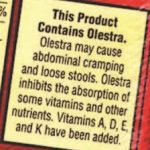 Fast-forward to 1987, by which time the company had amassed enough long-term data to submit an application to the FDA for Olestra. Nine years later, in 1996, the FDA approved its use in the manufacture of potato chips, tortilla chips, and crackers—under the condition that a health warning label is printed on every bag, reading “This Product Contains Olestra. Olestra may cause abdominal cramping and loose stools (anal leakage). Olestra inhibits the absorption of some vitamins and other nutrients. Vitamins A, D, E and K have been added.”
Fast-forward to 1987, by which time the company had amassed enough long-term data to submit an application to the FDA for Olestra. Nine years later, in 1996, the FDA approved its use in the manufacture of potato chips, tortilla chips, and crackers—under the condition that a health warning label is printed on every bag, reading “This Product Contains Olestra. Olestra may cause abdominal cramping and loose stools (anal leakage). Olestra inhibits the absorption of some vitamins and other nutrients. Vitamins A, D, E and K have been added.”
P&G approached Frito-Lay with a licensing deal to use Olestra to make fat-free potato and tortilla chips. Not long after, Lay’s, Ruffles and Doritos WOW! chips hit the store shelves, with millions of dollars in advertising and publicity behind them. A snack food that could be consumed by the bagful repercussion-free? Although that’s not exactly what the messaging was, that was the message received by America’s couch potatoes, and they were all-in.
The Internet hadn’t hit full stride yet and social media was still years away, but it didn’t take long for the proverbial you-know-what hit the fan. Soon everyone had heard an Olestra story, each seemingly worse than the one before it. The Center for Science in the Public Interest reported that a “63-year-old Indianapolis woman ruined three pairs of underwear and had no friends for two days after eating Olestra chips.” An independent study found that eating only 16 Olestra potato chips caused diarrhea in half of the participants. Meanwhile, people (as they still do now) were downing entire bags of these chips—far more than any testing had anticipated. Comedians were having a field day with “anal leakage” jokes. Damage control efforts proved futile and Olestra quietly disappeared from the market.
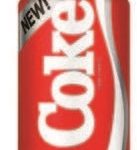 NEW COKE • 1985
NEW COKE • 1985
If you lived through the 1980s, you no doubt remember the fall of the Berlin Wall and the end of the Cold War. But how about the Cola Wars? During those fizzy-headed years of Miami Vice, Mad Max and mullets, Coke and Pepsi faced off in a grudge match for the title of King Cola.
First: a little history. For nearly a century since the birth of both companies, Pepsi had remained a comfortably distant competitor to Coca-Cola. During World War II, thanks to exclusive government contracts and exemptions from sugar rationing, Coke—not Pepsi—shipped out with America’s military, which resulted in the building of 64 bottling plants from Manchester to Manila and make Coke the most-recognized brand on the planet. In the postwar years, Pepsi was quick to target the only market left open to them, which to their great good luck happened to be the biggest ever: America’s Baby Boomers. In 1975, Pepsi discovered its competitor’s Achilles’ heel. It began airing commercials showing hidden-camera blind taste-tests (aka The Pepsi Challenge), which showed conclusively that people preferred the taste of Pepsi to Coke just over half the time. As a result, that year, Pepsi surpassed Coke in supermarket sales. Coca-Cola ran its own blind tests and, much to its corporate dismay, came up with identical results.
No one in Atlanta pulled the fire alarm until 1981 when new Coca-Cola CEO Roberto Goizueta and President Robert Keough set their chemists to work creating an entirely new “Holy Grail” formula that would beat both Pepsi’s and Coke’s original flavors. After three years of experimentation and blind-testing 200,000 consumers, they felt statistically certain that they had a winner. So certain were they, in fact, that they completely discontinued production of the original formula and replaced it with the new one, spending tens of millions in advertising and PR to ready the public for the switch. By the time they were ready to premiere “New Coke”, 96% of Americans knew about it—more than who could name the President of the United States (for the record, it was
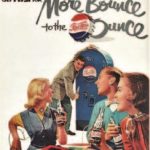
Upper Case Editorial
Ronald Reagan). It was a masterwork of strategic marketing.
Except for one thing. It wasn’t The Real Thing.
People tried “New Coke” and freaked out. They hated it. They called it “Coksi” and “Pepsi in drag.” Five thousand nasty phone calls a day poured into Coca-Cola’s headquarters—and that was back when calling Georgia was a toll call. Songs were recorded and played over the airwaves: “Please don’t change the taste of Coke. Why would you want to fix it? It ain’t broke!” Sales cratered.
Goizueta and Keough had overlooked the most important and valuable quality of Coke: authenticity. To millions of Americans and billions all over the world, Coca-Cola was more than just a soft drink. It was an American icon. Changing its formula was akin to “updating” the Statue of Liberty with an 80s wardrobe makeover. Or adding a base in baseball. Or spitting on the Flag. Or Mom. Or her apple pie.
It took Coca-Cola exactly 11 weeks to bring back the original formula, renaming it “Classic.” Sales rebounded, then skyrocketed. Goizueta and Keough had survived one of the dumbest corporate decisions in the history of consumer products and taught every other marketer an important lesson. Now when you describe something as “New Coke” you need to say nothing more.
A common conspiracy theory remains that Coca-Cola deliberately launched New Coke as a pariah, in order to stoke loyalty for the true original. Well… at that time, my stepdad was president of the ad agency handling the Sprite and Minute Maid accounts for Coca-Cola, so he had a boardroom-side seat to the whole mess. When I asked him about it, he simply told me what Keough had said: “We’re not that smart, and we’re not that stupid.” Maybe the happy moral of this story is: Familiarity doesn’t always breed contempt.
BLAST from the PAST 
In the mid-1950s, the Ford Motor Company launched an entirely new division to compete with rivals General Motors and Chrysler in the growing mid-priced field. Henry Ford II assigned the task to his “Whiz Kids,” a group of 10 veteran officers from the Army Air Force Office of Statistical Control who had steered Ford out of near-bankruptcy just after World War II. They were masters of corporate finance and management but had no practical experience with marketing cars. Using statistical analysis and the nascent social science of “motivational research,” the Whiz Kids set about producing a car that offered everything that the average customer could possibly want—and wound up creating one that nobody wanted: the automotive dumpster fire we now know as The Edsel.
The Edsel was available in four trim classes, six body types, and 90 head-spinning color combinations. It offered several design wow-factors, such as “Teletouch” automatic transmission, which was operated by push buttons located in the center of the steering wheel. This happened to be where the horn button was in virtually every car made since 1920. One can only imagine how many times Edsel drivers were “wowed” by both frightening silence and physical agony after pressing their palms full force into the jagged edges of the Teletouch control center at the moment of a traffic emergency. You get the idea.
“Do you get the idea that Decker pushes at the edges of possibilities without going too far?”
By Andy Clurfeld
Rabbit, take two—I’m thinking to myself as I cop a fourth—then a fifth bite of the slow-braised meat, might taste even better than the first time I’d tried it a few weeks earlier—at the reinvented 100 Steps in Cranford. The dish takes in a lot of moisture during its daily slow-cook, and what I taste in every bite of that meat is a concentrated infusion of liquid, seasoning and the kickback of accents: currants, Castelvetrano olives and, in a tip of the hat to the classic French preparation of rabbit in mustard sauce, the playful tang of pickled yellow mustard seeds. I spear a triangle of polenta, crisped by a crusting of parmesan, into the rabbit’s broth and wonder how soon I can get back to 100 Steps to eat, and think more about this dish that I hope will be fending off the cold all season.
It’s executive chef Kara Decker’s rabbit, a signature dish on her new menu at her old stomping grounds. And it’s proof positive that you can go home again.

Photos courtesy of 100 Steps Kitchen + Raw Bar
In a Reader’s Digest-style condensed recap, Chef Decker was the go-to gal in the kitchens of A Toute Heure and its spinoff sibling 100 Steps when both were owned and operated by Andrea and Jim Carbine. For years, Decker cooked her heart out at the block-apart restaurants—and won the hearts of locals and destination diners. Flash forward to the Carbines selling the two restaurants to separate owners, new chefs taking charge, and subsequent chef changes.
Then, this past fall, Jack Tagmouti, the new owner of 100 Steps, connected with Decker and brought her back to the kitchen she’d shepherded in its infancy and early childhood. They kept the raw bar, a seminal component that spotlights in-season oysters, while Decker re-focused the menu to hone in on her gutsy, decidedly un-shy dishes that sift through the Mediterranean repertoire until hitting solid gold.

Photos courtesy of 100 Steps Kitchen + Raw Bar
Hence, the rabbit, which Decker labels “Spanish” and I would argue also manages to tap into essential flavors that cooks in Sicily and Provence might bring to the dish. She broadens her vision again in an appetizer that, elsewhere, has become clichéd, by frying pork belly and setting it atop a creamy parsnip puree surrounded by dots of pear puree and then drizzling the pork with a fish-sauce vinaigrette that gives it a briny, caramel-y boost. Hot red Fresno chilies and mint, a nifty two-step, finish this Euro-Asian number, which also came with a tangle of gently pickled onions, which I demolished before handing it off to my too-polite guests.
Do you get the idea that Decker pushes at the edges of possibilities without going too far? Goes for forward flavors that don’t fight with each other for attention on her plates, but complement and flatter each other? Works, and works hard, at guiding her diners to new ways of looking at familiar foods? She does all of that in her rendition of grilled octopus: Smoky-to-the max with an emulsified pimenton vinaigrette, the soft-bodied cephalopod tangos with an escabeche of endive and black kalamata olive oil, adding smacks of acidity and salinity to each bite. What else is needed? Potatoes, of course, the traditional sideshow to octopus, and a component that, here, proves a perfect mate to that soulful Spanish paprika in the vinaigrette that is the foundation of this dish.

Photos courtesy of 100 Steps Kitchen + Raw Bar
Impressive are Decker’s pastas, which don’t employ shapes you only find in Italy or sauces that seem borne in uncharted territory. There’s a tagliatelle Bolognese, chunky with multiple cuts of pork and beef, warmed by a subtle shake of nutmeg, and topped by both a scoop of house-made ricotta and a dusting of Parmigiano-Reggiano. There’s orecchiette that snuggles up to cubes of butternut squash and strips of Lacinato kale before being sucker-punched by Decker’s own heat-charged chorizo—a surprise that you have to assume would overpower the little ears, sweet-nutty squash, and sweet-delicate kale. Nope; crumbled, but left chunky enough to collaborate in a fine bite with the squash, and/or kale, and/or pasta, the chorizo revs up a plate that could be sleepy or (maybe) calm. I like excitement.

Photos courtesy of 100 Steps Kitchen + Raw Bar
That same pizzazz is brought to Kara’s Mussel Pot, the genre she made famous in our state at A Toute Heure and again at the original 100 Steps. She built late autumn’s pot around meaty mussels and knuckle-size nuggets of chorizo, then tamed the sausage’s heat a tad by lacing a garlic cream sauce with saffron, mild Dijon mustard and skinny slivers of caramelized shallots. You’ll be given a spoon and you should use it to scoop up chorizo and mussels and sauce all at once. If you remember the Parker House rolls that were all the rage at the old A Toute Heure and 100 Steps, they’re here; though the mussel pots are served with crostini, I see no reason not to use the rolls as sop-up agents to that crazy-delicious cream sauce. Baby food? Maybe. But I loved it.
I’m batting clean-up here with Decker’s fish dishes, but they’re hardly also-rans. One night, there was a black bass special, the fillet keeping its skin on and super-crisped as a counterpoint to the buttery mashed potatoes and the sultry roasted tomato coulis underneath. Another night, there was skate wing, looking downright gorgeous splayed atop white beans—punctuated by nibs of carrots, onions, and herbs, and topped with a taut kind of pesto dominated by green olives. Those meaty olives brought structure to the silky fish/ultra-creamy bean combo, but what made the dish a standout was a generous crown of toasted bread crumbs. Let me swap out “crown” for “tiara.” That’s a better fit.

Photos courtesy of 100 Steps Kitchen + Raw Bar
Though the desserts at 100 Steps are well made, I was wishing for something citrusy or more fruit-focused in the lineup. That isn’t to say I didn’t cotton to the apple tartlet, with its admirably shortcrust, almond-infused cream filling and cleverly shaped cookie-like lid shielding the slices of apple, but this one’s about pastry, not fruit. A swell dome of chocolate sabayon fortified with chocolate dacquoise also benefits from that short dough base and gets a lift from a bright raspberry coulis. There was lots of oohing and ahhing at my table over the confection called The Colombian, a layering of chocolate mousse and dulce de leche interspersed with layers of chocolate dacquoise and encased in chocolate coating. I know… I’m a minority voter as a fruit-for-dessert lover.
But I love Kara Decker’s cooking, and I love this new version of 100 Steps. I love the fact that this chef is unabashedly bold about flavor and constantly experiments, tweaking dishes from her past and trying out ingredients novel and even unexpected. I love the fact that, in defiance of custom, the reinvention of this restaurant doesn’t rely on pure nostalgia, but rather on fortifying its strengths and powering forward.
100 STEPS KITCHEN + RAW BAR
215 Centennial Avenue, Cranford Phone: (908) 276.0153 • 100stepsrawbar.com
Major credit cards and reservations accepted. BYOB. Open for dinner and happy hour Wednesday through Sunday. Though 100 Steps does not have a liquor license, diners bring their own libations during happy hour, which starts at 4 p.m. and at which raw bar and menu items are served. Proprietor Jack Tagmouti and his team—including executive chef Kara Decker and manager/events director Rick Sue-Poi— produce private events at the restaurant, host collaborative dinners, and coordinate tastings that range from oysters to artisan foods and farm products.
Editor’s Note: With Chef Decker’s seasonally attuned menus, there are more wine-friendly dishes than ever on tap at 100 Steps. The next time you’re looking for an appropriate BYOB to try out your latest acquisitions, snag a reservation and load up your wine tote.
Dreams come to everyone, day and night. Think of all the children who dream of 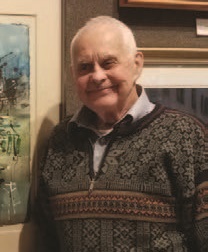 what they want to be when they grow up. Lady Gaga? Batman? A paleontologist? As a young boy, Werner Carl Burger declared that he wanted to be an Abstract Expressionist. The German-born painter never wavered from achieving his dream, no matter what the waking world had in store.
what they want to be when they grow up. Lady Gaga? Batman? A paleontologist? As a young boy, Werner Carl Burger declared that he wanted to be an Abstract Expressionist. The German-born painter never wavered from achieving his dream, no matter what the waking world had in store.

Forest Flame
18” x 20”, Oil on Canvas
When Werner Carl Burger first began making art, he thought it was just something fun to do. “It was when I started teaching that I really felt something,” the Stockton resident recalls. “I wanted to be a guide and emphasize the intellectual aspects of art for my students, the history and philosophy, knowledge in general.”

In Memory of Peter Jones 24” x 30”, Watercolor
And teach he did…for 40 years at Kean University. It was an honor, he says, to be a professor of art. Though Burger garnered numerous awards during his career, he never let it go to his head: “I see other artists’ great work at art shows and always wonder if I’m good enough.” When informed that Leonardo wrote that one moment he’d ask God’s forgiveness for being a lazy lout—and the next moment he’d think he was the greatest artist in the world—Burger roars with laughter. His work graces museums and public spaces throughout the U.S.,

Liquid Forest
16” x 20”, Oil on Canvas
including the Smithsonian Institution, the Philadelphia Museum of Art, and the Newark and Montclair museums. At 94, he is a major figure in the art community and, particularly, a New Jersey master. —Tova Navarra

Love Forest
16” x 20”, Oil on Canvas

Turnpike #2 Jersey City 60” x 55”, Watercolor

Tumble Town
8” x 10”, Watercolor

City Light
8” x 10”, Watercolor

Normandy France 11” x 14”, Watercolor

Rafael’s Town
10” x 14”, Watercolor
New procedures & improved outcomes are among the game-changing strides in robotic surgery.
By Erik Slagle
The future ain’t what it used to be, as Yogi Berra famously said. No one has a flying car, entire meals don’t come in pill form, and teleportation’s still not an option. Robots? Well, that one we’ve got…especially in the medical profession. They may not look like the droids from Star Wars or even the Jetsons’ beloved Rosie, but new advanced robotic systems have drastically improved surgeons’ ability to deliver top-quality care in performing some of the world’s most intricate, complex procedures.
Operations that used to involve significant incisions (and unsightly scars) can now be performed through smaller, single-site entries. Patient blood loss is reduced and discomfort is often minimized—and without any compromise in favorable outcomes. What’s not to like?
Dr. Mark Preston, an Obstetrician-Gynecologist at Trinitas’ Center for Advanced Pelvic Surgery since 2016, is one of thousands of providers around the country using robotic and laparoscopic equipment in their practices. “Robotic systems like the Single-Site da Vinci system facilitate treating more complex cases in a minimally invasive fashion,” he says. “They’re especially beneficial on cases that require precise, fine dissection and laparoscopic suturing. Also, recovery times are faster versus open surgery with large incisions, and less blood is lost. For the surgeon, the procedures are less physically demanding—the ergonomics are much better, as I can sit in a comfortable position and not have to stand in one place for more than an hour at a time.”

Dr. Sergio Baerga, Director of Robotic Surgery at Trinitas (far right), prepares to perform a double hernia operation using the da Vinci system.
Less fatigue enables surgeons like Dr. Preston to expand their caseloads, meaning more patients can benefit from those faster recovery times and improved outcomes. Doctors can operate more aggressively as robotic systems allow better access within the surgical field.
In the OB/GYN field, for example, the use of robotics has advanced how doctors treat conditions like endometriosis. The da Vinci system allows for unparalleled precision in identifying, lifting and excising lesions. In many cases, a one-time procedure with the da Vinci can clear a patient of all lesions and adhesions, saving their patient’s reproductive system. In the past, endometriosis treatments often meant a full or partial hysterectomy.
Preserving organs and saving body functions are primary goals of systems such as the da Vinci. Providers in the fields of general surgery, cardiology, and endocrinology—to name just a few—are all making use of these new, advanced systems. Dr. Sergio Baerga, Director of Robotic Surgery at Trinitas, performs various kinds of surgery using the da Vinci system, such as the double hernia operation (above). “Laparoscopic surgery was an improvement, but there were limits that we are able to overcome using robotics,” Dr. Baerga said.
For instance, in 2019, Trinitas-based ENT-Otolaryngologist Dr. Jonathan Cohen and his team performed their first radical tonsillectomy with Transoral Robotic Surgery (TORS), a minimally invasive procedure used to treat oropharynx cancers. TORS often eliminates the need for large incisions and division of the jaw bone that are sometimes required by traditional surgery.

www.istockphoto.com
Robots are now key players in helping surgeons tackle aggressive cancers of the bladder, uterus, prostate, throat and more. Dr. Clarissa Henson, Chair of Radiation Oncology at Trinitas, touts the benefits of robotics-assisted procedures in combatting these cancers and lessening potentially harmful side effects of follow-up treatments.
“We aim to increase the cure rate and quality of life for patients who can greatly benefit from minimally invasive surgery and targeted radiation,” Dr. Henson says. “Procedures such as the one performed by Dr. Cohen and his team reduce the space for radiation toxicity in muscles of the head and neck—that type of radiation is often required by traditional modalities of treatment.”
How It Works
With trained, talented surgeons at the controls, these robots are driving modern medicine into the future. The Single-Site da Vinci system allows a surgeon seated at a console to manipulate four robotic “arms” that can be rotated a full 360 degrees. The controls maneuver a camera and direct those instrument-equipped arms in cutting, holding, cleaning and coagulating all through a single or multi-port precise abdominal incision.
The system not only allows for greater dexterity but also great visibility—up to ten times stronger magnification —than do traditional surgical procedures. And if a second surgeon is needed, there’s no need for that doctor to “scrub in;” they can simply sit down at an adjoining console and assess the surgical field. Also, adds Dr. Preston, “when there isn’t a laparoscopically skilled resident available to assist, the robot makes it easier to perform these procedures.”
But the “how” behind these medical marvels may not be as important to patients as the “why”—and just about any way you measure it, it’s easy to see why robotics-assisted procedures are becoming the preferred option across the surgical profession. Trinitas continues to keep pace with the latest innovations, bringing state-of-the-art equipment into its Operating Theaters.
“Patients need to know that we are diligently scouring the science of medicine to provide care at the forefront of our fields,” says Dr. Cohen. “Trinitas is on board with elevating the gold standard of healthcare.”
When your adult child is dealing with opioid addiction, it’s no time to be their friend.
By Krystyna Vaccarelli, LCSW, LCADC Trinitas Regional Medical Center
When a public health issue becomes a crisis, and then goes from being a crisis to an epidemic, it is human nature to look for a “magic wand” solution. What switch, we wonder, can be flipped to turn back the clock, return the genie to the bottle, to make everything manageable again? If we are talking about the opioid epidemic, unfortunately, there is no magic wand. And no one is immune, either.
As the Director of the Substance Abuse Services at Trinitas Regional Medical Center, I know that there is no way to characterize that next person coming through our doors. It could be a 19-year-old who grew up in an environment of drug use, or a soccer mom from Short Hills who rolls into Paterson to buy heroin because the addiction has consumed her and the cost of illegal prescription pills is beyond her means. Socioeconomics plays no favorites where addiction is concerned; we’ve seen plenty of both. In fact, I can say with a high degree of certainty someone you know very well—but might never suspect—is in this predicament right now. The horrible piece of opioid addiction is that it is really easy for people to medication once your prescription has run out.
Everyone we see in the Substance Abuse program is somebody’s son or daughter. So what if that next person is your child? If you are concerned that your child might become addicted to medication—and really, every parent should be—there are some common-sense things you can do. For children who are minors, parents should accompany them into the examination room and be part of the conversation during any doctor’s visit. Ask what the minimum amount of medication is that will be needed to treat a condition—not just opioids, but anything that could have negative consequences down the road. Don’t just sit in the waiting area. If you are concerned about your adult child, remember that being an involved parent is important regardless of your child’s age. You may not be accompanying your kids to doctor’s appointments anymore, but they still need the structure, rules, expectations, and guidelines a parent provides. These are the foundational elements in setting them up as functioning adults.
I think a miscalculation many parents make is wanting to be a child’s friend once they hit those difficult ’tween and teen years. No one wants to be the bad guy and have to say No all the time, but does saying Yeah, Sure, Okay mean you love your kids more? That doesn’t make sense.
There will be time later on to be their friend.

www.istockphoto.com
Once a child moves away from home, of course, the nature of your contact changes. However, you can still see or hear things no one else but an involved parent would. If you notice a change, you don’t have to be afraid of acting. The sooner a parent intervenes, the better the outcome will be. Go with your gut if something doesn’t seem right, or if you have some questions you feel you should ask. Believe it or not, particularly if you have been an involved parent, contributing to the medical decision-making process shouldn’t strike your son or daughter as unusual. So you shouldn’t be timid about saying, “Wow, 30 pills? Doesn’t that seem excessive? Did you question your doctor about this prescription? Please be careful. It’s easy to become addicted—don’t go outside the prescription.” I believe that is reinforcing an aspect of the relationship that has been there all along. Indeed, it’s a product of the good groundwork you started when they were small children: being educated and aware. Now you are passing that education and awareness to your children as they become adults. Even if you don’t have that type of relationship, you can still say, “Hey, don’t listen to me if you don’t want to, but please get a second opinion.”
There is good research going on that is looking at people who might be more predisposed to becoming addicted to drugs than others—genetically predisposed, psychologically predisposed, perhaps a combination of both. That being said, we know quite a bit already from what we observe day-to-day in the Substance Abuse program. I cannot overstate how critical the family dynamic is in the big picture of the opioid epidemic—not just in recovery but also in the conditions that often surround addiction.
We see generations of addicts in the same family come through the program. It may be a physiological predisposition, but it might also be the culture or environment of the family. That’s the interesting question: Is it one or the other, or both? Most people would say that it’s the environment. However, we sometimes treat members from the same large family that are dispersed—they don’t interact with one another on a regular basis. And yet all of them are receiving some form of treatment, typically for mental health or substance abuse.
We also encounter a fair amount of fractured family situations in the patients we treat. That is why we offer family therapy, as well. A patient can come in and we will work with a parent or a spouse or a child as part of the program (everyone we treat must be at least 18, by the way). One of my frustrations is that we don’t get the level of involvement in this part of the program as I would like. Sometimes patients decline because they know that the family will provide a lot more information than they are willing to provide. Sometimes the family doesn’t want to come in. They have “compassion fatigue.” They are done emotionally, and maybe financially. The only upside is that maybe that’s a part of a patient’s rock-bottom, that they’ve lost everything and everyone, which means we can start building them up again.
A significant part of what we do at Trinitas is relapse prevention. We counsel people on techniques for dealing with everyday stress, how to be able to function without drugs. We teach them how to work through it, but it’s always a work in progress. Does anybody learn how to deal with absolutely everything? No, of course not. And that’s something else we teach our patients: You have to work your way through life’s challenges to the best of your ability. When someone completes the Substance Abuse Program, they leave with a toolbox for coping with the stresses and triggers that result in a relapse. Their job is to take the tools we’ve given them, and then use them as they need them.
The work we do here is face-to-face, both group and individual treatment. When you are talking to someone and looking them in the eye, it’s harder for them to walk away. You have a better ability to fully assess someone and pull all the information together. On the most basic level, say someone is sitting across from you and smells like alcohol. You’re going to know that. You wouldn’t know that if you were on the phone with them unless they were slurring badly. I do know that Trinitas is working on a telemedicine component. Is there a day coming when we will all be on screens in a circle talking to each other? Who knows? But human contact will always be vitally important. Our patients are vulnerable people looking for support. When someone is physically there for them, it means so much more. For that reason, we strongly advocate attending Alcoholics Anonymous and Narcotics Anonymous meetings, in addition to our program. AA and NA provide valuable support, too.
We interact with as many as 800 people a week in the Substance Abuse program. If that sounds like a lot, then you are still not appreciating the size and scope of the addiction problem out there. One of our strengths, I believe, is that each person who walks through the door is assessed and evaluated as an individual; because there is no typical person who seeks drug abuse treatment. Some are here for the first time. We have people we have seen 10 times or more. Sometimes we are the last place people went for treatment and they come back to update us on how they are doing. We get young and old—again, as long as someone is 18 or older we can provide treatment. We’ve seen it all. I don’t think there is anything that would surprise us.

www.istockphoto.com
For me, the job of Director is one I take personally. I call the people who come through this program “my patients”—because they are. I meet almost all of them when they begin the program. I am very much involved in the front-desk area during their intakes. I am one of the constants in this unit as far as the patients are concerned. They know who I am and I know who they are. We do clinical team meetings, where I absorb a lot of information about them and I am involved in the team decisions regarding each patient’s care. I run groups when needed. My job is to keep the program running at a high level, so it is different every day. But my role is always to support the clinicians and the patients throughout the process.
When I took this position at Trinitas, I felt in many respects that I was led here. I have worked in this field for many years and am very passionate about what I do. I believe that everybody deserves a fair chance and an opportunity. If you want it, we’re here for you.

www.istockphoto.com
Addiction In Women
Trinitas offers a Women’s Addiction Services Program, which is specific to women who have identified substance-abuse problems. In the program, patients learn how to deal with a wide range of women’s issues, as well as childhood trauma, anger management, and parenting challenges. The program has a small babysitting/childcare area with supervision for children 6 months to 12 years old, while their mothers are here seeking treatment. For more information, call (908) 994-7125.
Editor’s Note: Krystyna Vaccarelli, LCSW, LCADC has worked in the field of substance abuse and mental health for 20 years. She received a master’s degree in Social Work from Yeshiva University. Prior to coming to Trinitas, she was Director of Adult Outpatient Services and Addiction at Jersey City Medical Center. The Substance Abuse Program is located at the Trinitas New Point Campus at 655 East Jersey St. in Elizabeth. For more information on the program, visit trinitasrmc.org/a_nation_in_pain or call (809) 994-7090.
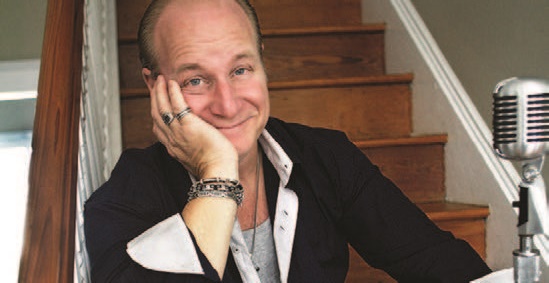 Room for Improvement: 2020 Edition
Room for Improvement: 2020 Edition
By Mike Marino
- I will be nicer to strangers, but will make up for it by being meaner to my children.
- I will no longer “own” my lactose intolerance by doing unspeakable things in the dairy aisle.
- I will be better about taking my Lipitor now that I know “salami hands” is not an actual side effect. I must have misheard something in the commercial.
- I will stop pranking my father by substituting salt-free saltines for his Stella D’Oro cookies. I will stop pranking my mother by substituting Alexa for her blood pressure monitor.
- I will start believing in love at first sight so I can stop obsessing over girls who won’t give me a second look.
- I will stop asking girls if they just saw my eye twitching. It’s not working as an ice-breaker.
- I will also stop using Ron Burgundy’s pick-up lines. They don’t work in the movies and they don’t work in real life.
- I will no longer leave small tips. My big tip for the year is that aged provolone is a horrible substitute for underarm deodorant.
- I will refrain from flirting with cocktail waitresses— unless they live within a 50-mile radius of the club.
- I will stop discussing my constipation issues with Vinnie, Nicky, Joey, Tony, Sallie and my mother—if they stop yelling “Can I buy a bowel?” whenever we all watch Wheel of Fortune.
- I will not drink anything stronger than wine for lunch. However, lunch will now start at 10:00 am.
- I will return all the crap I bought in the after-Christmas sales. I do not need a lawnmower. I don’t even have a lawn.
- I will not ask the nurse, “Are my tonsils out?” when I wake up from my next colonoscopy.
- I will stop asking people on the way out, “Do you need a colonoscopy…or do you just want one?”
- I will no longer steal the little soaps in my hotel bathroom. However, lightbulbs are still fair game.
- I will keep saying “at the hospital” instead of “at hospital” because I don’t want to sound like Tarzan.
- I will not waste money on a gym membership. Wandering aimlessly through the house at 3 am is just the right amount of exercise for me.
- I will stop telling other comics that I just signed a half-million dollar development deal with Netflix right before they go on stage—as soon as I get tired of watching the blood drain out of their faces. EDGE
Editor’s Note: When Mike Marino isn’t touring, he can often be found working out of his folks’ house in Scotch Plains. For more about the Bad Boy of New Jersey Comedy—including upcoming club dates—visit him on the Web at MikeMarino.com.
If you’re renting a car…THAT is the question.
By Sarah Lee Marks
Renting a vehicle has never been quicker or easier. In many cases, everything can be done online or through an app, avoiding the line at the counter altogether. You’ve seen the commercial: No waiting…just pick the car you want and go. One aspect of the transaction, however, hasn’t changed. In fact, it may be even more complicated. It’s the dreaded Liability/Damage/Personal Injury Waiver—which no one wants to pay for or even think about…but some of us definitely should.
The inclination for most is to decline this option. After all, between personal car insurance, credit card coverage and maybe even a homeowner’s umbrella policy, everything must be covered, right? Yes. Or no. Or maybe. In the end, it’s up to you to make that determination. And better to make it before something goes wrong than after.
Beth Hofgesang, an insurance agent with Arthur J. Gallagher in Whippany, suggests digging your auto policy out of whatever drawer or folder it’s in and reading it carefully before hitting the Decline button. Make sure you understand any exclusions as they relate to rental vehicles, as well as checking that your liability coverage actually extends to a rental. It’s time-consuming but well worth the effort. What if you just don’t feel like it?
“Then I usually recommend that my clients take the waivers and coverage offered by the car rental agency,” she says. “Their coverage includes loss of use, diminished value and allows you to walk in and get a replacement vehicle to continue your travel. Also, you avoid a claim against your own insurance, which will likely get you a premium hike over the next three-to-five years.”
If you do not own a car—or if your car is insured for less than the one you are renting—you should definitely take the rental car program, Hofgesang adds. “You can’t expect the insurance company covering your 1999 Jetta to pay a claim on your rented $150,000.00 Tesla.”

www.istockphoto.com
When you start reading the fine print on a waiver, you’ll likely notice that it is broken down into four types of coverage:
- Collision or Damage: The average cost for this coverage runs $10.00 a day for your rental vehicle. Your fault or not, paying for it at the counter keeps you off the hook for repairs. Agents often push you to buy this added coverage by explaining your Loss of Use exposure. Loss of Use is the daily rental fee the company isn’t getting while the car is in the body shop. Diminished Value should also be included in this coverage. Diminished Value is the reduction in vehicle value as a result of damage to the car while you were renting it. You may have this coverage on your car, but be aware that a claim to your insurance for a rental car crash affects your insurance premiums just the same. If you do not have Collision coverage on your personal car, consider purchasing a separate policy to cover your rental car.
- Liability Insurance Rental: agency liability coverage could cost as much as $18 a day for $1 million in coverage. If you have liability coverage on your own auto policy, skip this pitch.
- Personal Injury or Personal Medical Accident Insurance: For as little as $6 a day, you and your passengers’ medical bills from injuries resulting from a car crash are covered. Be aware that you may have personal health insurance or medical protection on your current auto policy. If so, ask the car company how much the top dollar value is on this policy and compare it to your own, before adding the cost to your rental bill.
- Stolen Property Coverage: Your homeowner’s policy covers items in your car, and by extension a rental car. Weigh the additional cost on your daily rental budget against the value of items that could go missing.
So what about credit card coverage? Yours may provide coverage for theft, collision, damage, tow and loss of use if you pay for the rental vehicle with your card. You may elect to take the rental company’s coverage if your trip extends beyond the coverage time limit of the card, or based on the type of car being rented. Check with your credit card supplier regarding limitations in the coverage before relying on the company to protect you. Ask if all drivers are covered, regardless of them being listed on the rental contract, or whether they are authorized users of the credit card. This is important information to know going into a rental if a spouse or relative or friend will also be driving and you’d like to avoid the “additional driver” fees. Rental car agencies want any driver using the vehicle to be listed on the agreement. If there is a crash with an unlisted driver, the damage waiver you purchase from the rental agency could be voided, leaving you with a fat bill or kicking it back to your own insurance.

www.istockphoto.com
What if you’re renting something other than a car for business or pleasure? This is a question few people ask. In most cases, moving trucks, trucks for hire from a place like Home Depot, and cars used for ridesharing or delivery services are not protected by the credit card company or your personal auto insurance policy. Also, coverage limitations are typical for exotic or luxury vehicles rented with your credit card, so know what they are.
If you’re that person who never rents a car, I’d like to congratulate you for getting this far in the story. And here’s your reward: If you are driving a loaner while your car is in the shop for repairs, you may be “renting“ without knowing it—at least from an insurance standpoint. You may be asked to sign a “borrowed car agreement” and the dealer will make a copy of your driver’s license and insurance card. Does that mean you are accepting the primary responsibility for insuring their vehicle in case of a collision, personal injury, loss of use and diminished value?
The answer is likely yes, unless you are specifically informed otherwise. Think about what might go wrong: Say they are tossing you the keys to a $30,000 loaner and you only have liability on your old car. You’ll be on the hook if there is a collision—even if it’s not your fault. Ask about the dealers’ policy before you sign anything. And if a crash isn’t your fault, be sure to collect all relevant information from the responsible party and obtain a copy of the police report. Failure to do so could land you with a huge repair bill and—even if your auto insurance covers the collision damage—you can expect a premium price hike after the claim.
Renting Abroad

www.istockphoto.com
Leaving the country and thinking of renting? Start by applying for an international driver’s license well before your planned departure. Also, contact your insurance agent to determine what your existing policy covers. There are third-party carriers who can provide an international auto policy. These plans act as the primary insurer and are separate from your personal car policy.
Editor’s Note: Sarah Lee Marks is a car concierge and automotive consumer advocate for all things car-related. Sarah lives in Henderson, Nevada with her husband, Norman. You can ask her car questions at her website: www.mycarlady.com.
Where will a 500-mile road trip land you?
By Jim Sawyer
Remember the good old days, when you could just hop behind the wheel on little more than a whim and just drive? For most of us, those carefree road trips are a vanishing speck in the rearview mirror. However, that doesn’t necessarily mean that an old-fashioned road trip is totally off the plate. If that sense of adventure is still stirring inside of you, why not pick a direction and distance and see where life’s highway takes you? Okay, a little pre-planning probably makes sense, but you know what that old road warrior Ralph Waldo Emerson said: It’s not the destination…it’s the journey.
A solid day’s drive, say eight to nine hours, puts you in 500-mile territory. Where those 500 miles take you depends on the direction you choose, but—using the EDGE parking lot as a starting point—I found quite a variety of places that fall neatly within that range.
 SNAPSHOT: The population of North Carolina’s state capital has quadrupled since the early 1970s, and it has transformed every conceivable aspect of the city—particularly in the last decade or so. It used to be a place you drove through (as quickly as possible) to get from college towns to the beach. Now it is young, diverse and vibrant. Forbes rated Raleigh the #2 city in America to run a business or build a career.
SNAPSHOT: The population of North Carolina’s state capital has quadrupled since the early 1970s, and it has transformed every conceivable aspect of the city—particularly in the last decade or so. It used to be a place you drove through (as quickly as possible) to get from college towns to the beach. Now it is young, diverse and vibrant. Forbes rated Raleigh the #2 city in America to run a business or build a career.

Alex Israel
Must See: The North Carolina Museum of Art—one of several superb museums in the city—recently underwent a lovely renovation. It features dozens of galleries and a 164-acre museum park.
Must Do: Lunch, dinner and after-hours Downtown. Young, upwardly mobile urbanites and foodies from the surrounding ‘burbs have kicked the restaurant and club scene up a notch.

Christian Geischeder
Must Eat: Carolina Barbecue. It’s vinegar-based in this part of the state with no tomato and uses every edible part of the pig. The Pit is one of several go-to spots in Raleigh.

Keith McDuffee
Hometown Hero: Dexter star Michael C. Hall
Little Known Fact: Raleigh’s pro hockey team, the Carolina Hurricanes, was established in 1972 as the Hartford Whalers. The ’Canes won the NHL’s Stanley Cup in 2007.
 SNAPSHOT: A sleepy town of 13,000 on the North Carolina border, Martinsville snaps to life twice a year when NASCAR rolls in. The town is named in honor of Joseph Martin, a Revolutionary War general, and became known for its chewing tobacco and, more recently, its furniture and textile manufacturing. For many years, it proudly called itself the “Sweatshirt Capital of the World.”
SNAPSHOT: A sleepy town of 13,000 on the North Carolina border, Martinsville snaps to life twice a year when NASCAR rolls in. The town is named in honor of Joseph Martin, a Revolutionary War general, and became known for its chewing tobacco and, more recently, its furniture and textile manufacturing. For many years, it proudly called itself the “Sweatshirt Capital of the World.”
Must See: Virginia Museum of Natural History—an affiliate of the Smithsonian in Washington—has 22 million items in its collection, including an Allosaurus skeleton that towers over visitors entering the building.

Dough4872
Must Do: Race weekend at Martinsville Speedway. One of the first paved NASCAR tracks—and the only one still in existence since the organization was founded in 1948—it is also the shortest at just over a half-mile. The turns are banked only 12 degrees, testing drivers’ braking and accelerating skills and making for precious little passing room.
Must Eat: Soul Food at Walsh’s Chicken 
Hometown Hero: Founding Father Patrick Henry
Little Known Fact: During the Cold War, Martinsville’s nylon factory put it high on the list of targets for a Soviet missile attack.
 SNAPSHOT: Located on Lake Erie between Toledo and Cleveland, Sandusky has a permanent population of 25,000 that swells during the summer months, as tourists travel from all over the region to visit its amusement parks and off-shore islands. In 2011, Forbes ranked the city the #1 “Place to Live Cheaply” in America.
SNAPSHOT: Located on Lake Erie between Toledo and Cleveland, Sandusky has a permanent population of 25,000 that swells during the summer months, as tourists travel from all over the region to visit its amusement parks and off-shore islands. In 2011, Forbes ranked the city the #1 “Place to Live Cheaply” in America.

Ken Winters

Must See: The Merry-Go-Round Museum, located in a stately old post office building, features a 1939 carousel you can ride for free with admission.
Must Do: Ride the roller coasters at Cedar Point. At last count there were 17 of them—six taller than 200 feet—making the park the self-proclaimed roller coaster capital of the world.
Must Eat: Toft’s Ice Cream, produced by the state’s oldest dairy.
Hometown Hero: 1963 Miss America Jackie Mayer
Little Known Fact: The name Sandusky is not of Eastern European origin. It is derived from a Native American word meaning “cold water.”
 SNAPSHOT: Toronto is the best city you’ve never been to. Forget what you picture when you picture Canada. Half the people in Toronto proper are probably from somewhere else. It informs the food, the arts, the street life and just about everything else. The country’s most populous city is clean, safe and gorgeous—even when the February wind off Lake Ontario makes you cry for your mommy.
SNAPSHOT: Toronto is the best city you’ve never been to. Forget what you picture when you picture Canada. Half the people in Toronto proper are probably from somewhere else. It informs the food, the arts, the street life and just about everything else. The country’s most populous city is clean, safe and gorgeous—even when the February wind off Lake Ontario makes you cry for your mommy.
Must See: A ballgame from a hotel room at the Rodgers Center, the city’s famous domed stadium. The Marriott City Centre features guest rooms with views from high up in the outfield. Just remember, those 50,000 fans have as good a view of you as you do of them, so keep the kimono closed, please.
Must Do: Ride to the top of the CN Tower, at 1,815 feet the world’s tallest tower until 2009, when it was surpassed by the Canton Tower in China.

Leventio
Must Eat: Pemeal Bacon Sandwich. Warning: if you love bacon your head might explode. There are several places that make it in St. Lawrence Market.
Hometown Hero: Drake

Courtesy of The Come Up Show
Little Known Fact: The Toronto Argonauts have won more Grey Cups (the Canadian Football League version of the Super Bowl) than the 49ers, Cowboys and Patriots have won Super Bowls…combined.
SNAPSHOT: Bar Harbor is the main town on Mount Desert Island, so part of your 500-mile journey will require a car ferry. Part of Maine’s heralded Down East region, Bar Harbor has a long history as a summer and fall tourist haven, and has become a destination for lovers of the outdoors. A portion of Acadia National Park sits within the town’s borders. The harbor itself was an important stop for transatlantic schooners in the 18th and early 19th centuries.
Must See: Stained glass at St. Saviour’s

Wladyslaw
Must Do: Summit Mt. Cadillac in Acadia National Park
Must Eat: Breakfast at Everyday Joe’s
Hometown Hero: Sportswriter Shirley Povich
Little Known Fact: Bar Harbor previously went by the name Eden, and once rivaled Newport as a playground of the rich and famous—including the Astors, Vanderbilts and Rockefellers. In the fall of 1947, following a summer of drought, a wildfire burned for nearly a month and destroyed several hotels and dozens of summer homes.
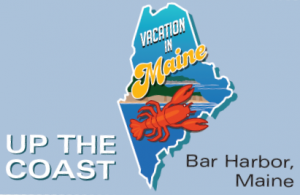
Brian Snelson
SNAPSHOT: Bar Harbor is the main town on Mount Desert Island, so part of your 500-mile journey will require a car ferry. Part of Maine’s heralded Down East region, Bar Harbor has a long history as a summer and fall tourist haven, and has become a destination for lovers of the outdoors. A portion of Acadia National Park sits within the town’s borders.  The harbor itself was an important stop for transatlantic schooners in the 18th and early 19th centuries.
The harbor itself was an important stop for transatlantic schooners in the 18th and early 19th centuries.
Must See: Stained glass at St. Saviour’s
Must Do: Summit Mt. Cadillac in Acadia National Park
Must Eat: Breakfast at Everyday Joe’s
Hometown Hero: Sportswriter Shirley Povich
Little Known Fact: Bar Harbor previously went by the name Eden, and once rivaled Newport as a playground of the rich and famous—including the Astors, Vanderbilts and Rockefellers. In the fall of 1947, following a summer of drought, a wildfire burned for nearly a month and destroyed several hotels and dozens of summer homes.
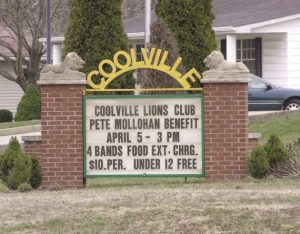 Are You Too Cool for Coolville?
Are You Too Cool for Coolville?
One of the more intriguing spots at the 500-mile mark is a town of 500 people, called Coolville. It’s situated on the Hocking River in Ohio. The village celebrated its 200th anniversary in 2018. Coolville was laid out by Simeon Cooley, a New Englander who opened a flour mill with his brother, Herman. If you decide to stay, land is a bargain: The taxes on a 60-acre wooded lot currently for sale run a whopping $23 a year. While you’re in the area, why not visit the nearby towns of Torch and Frost?
Confessions of a cereal consumer.
By Mark Stewart
As a boy, I found milk to be utterly disgusting. I didn’t like the color, the taste, the smell or the texture. The bottles were too heavy and, when it started coming in cardboard, the opening never separated properly. All these years later, I honestly cannot remember drinking a glass of plain milk. Not that I didn’t—I’ve just tried really hard to bury that memory. Whenever I visited a friend’s house, I’d tell his parents preemptively that I was allergic to milk. One mom said, “Too bad, I poured it…you drink it.” Hello? Child Services?
Eventually I wore down my parents. The final peace treaty was that I didn’t have to drink milk if I consumed a bowl of cereal each morning. So of course I would pour as little milk as possible, sometimes just a drop or two. It took a couple of years, but I won and the adults stopped caring. The problem was that, by this point, I was kind of hooked on dry cereal. And here I am, a half-century later, still cleaving off from my spouse on our joint supermarket trips to explore the breakfast aisle looking for interesting boxes to stash in the pantry.
I say this unabashed. Every so often, I need something sweet but not too sweet, with a good, eardrum-rattling crunch.
I suppose I’ve convinced myself that a handful of Honey Nut Cheerios is healthier than a handful of potato chips. Maybe they are. I really don’t know. What I do know is that, starting in the early 1960s and running right up to college in the late 1970s, I became something of a dry cereal aficionado. Or addict, if you prefer. I was on the winning side of Quisp vs. Quake and can still rattle off the jingles of defunct cereal brands. The human brain apparently has a mind of its own; I know this because after 10 years I still can’t remember my younger daughter’s phone number.
My babysitter was a Zenith 19-inch TV so I basically saw every cereal ad ever made, again and again and again. Cereal commercials from my youth employed myriad strategies to convince kids it was worth harassing their parents into buying this box or that. The “free toy inside” could be an effective sales tool, but the toys were always lame and if the cereal was, too, then you moved on pretty quickly. The most impactful cereal commercials were probably the ones that aired during morning cartoons, and were also cartoons themselves. A lot of these characters are still with us, as you know, but they’ve been cleaned up for 21st century sensibilities.
The Coco Puffs bird of my childhood (his name was Sonny) was severely ADHD; now he’s been effectively medicated, although the brown sugar-balls probably aren’t doing him any good. 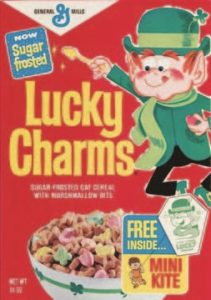 The Lucky Charms leprechaun that the kids were always trying to catch sounded like the kind elderly first-generation Irish gentle- men who lived in my neighborhood. But “Lucky” sure didn’t look like them. As I got older, I realized he was a racist caricature that had barely been updated since the 1800s. Lucky Charms are still around, but the new guy on the box has been drawn with a bit more cultural sensitivity.
The Lucky Charms leprechaun that the kids were always trying to catch sounded like the kind elderly first-generation Irish gentle- men who lived in my neighborhood. But “Lucky” sure didn’t look like them. As I got older, I realized he was a racist caricature that had barely been updated since the 1800s. Lucky Charms are still around, but the new guy on the box has been drawn with a bit more cultural sensitivity.
Not for nothing, but what the devil were those marshmallow-dependent hoodlums planning to do to that poor leprechaun? I swear there was one commercial where they were trying to drown him in a well and take his cereal. Talk about crossing the line.
Actually, the cereal commercial I can’t quite get out of my head is a particular one for Sugar Pops. It was a live-action ad that featured a cowboy in a cornfield. He tosses an ear of corn in the air and cracks it with his whip, which creates a cascade of glazed yellow mini-boulders that fall neatly into the box. Oh…so that’s how they make those things. No one I knew could actually stand the cereal, but for several weeks the boys in my grade were obsessed with whipping things. I guarantee if I look these guys up on Facebook, one or two of them will still be into whips.
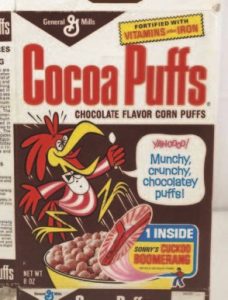 Like Coco Puffs and Lucky Charms, Sugar Pops are still around. I believe they are just called Pops these days. You see, a lot of cereals removed “sugar” from their names a few years ago. Who eats Pops now, I wonder? Arthur Fiedler fans? Because that’s kind of a limited market.
Like Coco Puffs and Lucky Charms, Sugar Pops are still around. I believe they are just called Pops these days. You see, a lot of cereals removed “sugar” from their names a few years ago. Who eats Pops now, I wonder? Arthur Fiedler fans? Because that’s kind of a limited market.
Many of the cereals of my youth came and went after brief, unsuccessful runs. I tried them all and remember most. After Hawaii was admitted to the union, Madison Avenue leveraged the state’s newfound celebrity and rebranded a number of consumer products. The one we all know is Hawaiian Punch, which actually played off the word “punch” more than “Hawaiian.” You’ll recall that every commercial was a textbook case of felony assault. At about the same time, Kellogg’s came out with Puffa-Puffa Rice, which was basically Rice Krispies sprayed with a brown sugar and honey after-coating. In the TV commercial, Hawaiian natives dumped bushels of rice into an active volcano, then hauled their grass-skirted butts off the mountain before it blew. And when it blew, it spewed out a delicious pyroclastic flow of the aforementioned puffed rice. As a dry cereal, it was sticky on the hands, but still pretty good. Puffa-Puffa Rice disappeared sometime in my teen years.
By then, I had been sucked in by a new genre of breakfast cereal: brand extensions of the actual cartoons we watched. Who didn’t love the Pink Panther, right? It was a fast-moving half-hour of clever, subversive unpredictable violence and fun—a perfect Saturday morning warm-up for a weekend with my family. Well then, who wouldn’t love Pink Panther Flakes? These were Frosted Flakes with an unhealthy dose of Red Dye #2 that made them glisten when the light caught them just right. The gimmick was that the cereal turned your milk pink. Well, that sounded disgusting to me and, apparently, it was, because it didn’t even outlast the cartoon.
I mentioned the Quisp and Quake feud earlier. This was a brilliant piece of marketing. Kids didn’t have much say in anything back then. The idea that the “losing” cereal (it was Quake) would blip out of existence was incredibly empowering for a child. As the day of reckoning drew near, the tension was palpable. It was like watching returns in a razor-thin election, except it wasn’t for something stupid like governor or senator or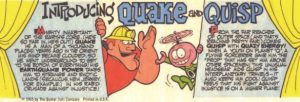 President of the United States. This was breakfast-table life and death. Most kids who tried both realized Quisp and Quake were essentially the same cereal, just different shapes: Quisp was an alien, so his shape was a flying saucer, while Quake was some sort of jackhammer operator, so his shape looked like chunks of construction material. Prior to the contest, they changed Quake to a cowboy or a safari guide or something that didn’t make much sense. Well, duh, you don’t do that so close to a national election. When the results were announced, Quisp won in a Nixon-like landslide, while Quake probably didn’t even win his home state.
President of the United States. This was breakfast-table life and death. Most kids who tried both realized Quisp and Quake were essentially the same cereal, just different shapes: Quisp was an alien, so his shape was a flying saucer, while Quake was some sort of jackhammer operator, so his shape looked like chunks of construction material. Prior to the contest, they changed Quake to a cowboy or a safari guide or something that didn’t make much sense. Well, duh, you don’t do that so close to a national election. When the results were announced, Quisp won in a Nixon-like landslide, while Quake probably didn’t even win his home state.
At about the same time—and I know that no one with a real job will remember this—there was another cereal feud trying to break through the noise. Borrowing from Quisp and Quake, while also riffing off of Snoopy and the Red Baron in the Peanuts cartoon strip, were a pair of World War I fighter pilots, Baron von Redberry and Sir Grapefellow. Grapefellow was a Brit, while von Redberry broke Teutonic. With the older brothers and cousins of kids you knew coming back from Vietnam not quite whole anymore (or not at all), what better way to sell breakfast cereal than by celebrating a conflict that killed 20 million people? Not surprisingly, both pilots crashed and burned shortly after takeoff, but let me tell you…the grape flavor was a bold move and I thought it was one of the great dry cereals.
Incidentally, as a child and, yes, as an adult, I put bananas in the same category as milk, a category I call “Nope. Nope. Nope.” My parents loved to slice bananas directly onto their cereal. It was horrifying to me on a molecular level. The only upside was that I knew for sure they were telling me the truth about my being adopted.
Cereal makers tried again and again to come up with products that approximated the taste of freshly sliced bananas—sometimes with an artificial spray or flavoring, sometimes with freeze-dried pieces that reconstituted into banana mush when bathed in milk. The summer I turned seven, I noticed Kellogg’s Corn Flakes with Instant Bananas during a supermarket visit. Naturally, the concept was disgusting to me…but at the same time oddly intriguing. Maybe, I thought, crunchy freeze-dried bananas would work for me as a milk-less cereal. I stared at the box for a long time, which is how you make buying decisions at that age. The character on the front was a banana-man with a windbreaker formed by his own banana peel. I think he also had a hat tilted at a slightly rakish angle. Well, he seemed like a decent enough guy, so I snuck it into the cart.
At the checkout register, my mother did a double-take when I placed the box on the conveyer belt. She squinted at me, looked back at the banana-man, squinted at me again hard, and then sighed and said, “Okay.” I knew what that meant: She thought I’d consume one dry handful, make a fake gagging sound and then throw it away (and within an hour she would be proved correct). Mom could have started a public confrontation, and it wouldn’t have been her first, but apparently that was not the hill she planned to die on that day.
So recently I encountered a box of Kellogg’s Corn Flakes with Instant Bananas for sale on eBay. In retrospect, I see that the banana-man definitely had a registered sex offender vibe. I wonder if that’s why my mother was squinting at me. Anyway, I still buy the occasional box of “healthy” cereal now with banana bits, which are still a thing, ever hopeful that my taste buds have matured. Sadly, they have not. Dried bananas still make me fake-gag.
Meanwhile, my quest for another grape-flavored cereal continues. (Shame on you, Grape Nuts, by the way, for teasing me my whole adult life). Blueberry Cheerios, which I picked up on sale at a CVS recently, came pretty close flavor- and crunch-wise to what I was looking for, but they fell short. I suspect that they will be on sale forever, because they don’t taste much like anything found in nature and have the additional disadvantage of approximating the color of death.
Another cereal I encountered recently while shopping for something else was an old favorite, Alpha-Bits. I flashed back to what I believe to have been the first time that I made someone laugh with words I wrote. I was six years old and, okay, it was one word. And it’s a word we can’t print in this magazine. And it was a word I assembled on a spoon, not one I wrote on paper.
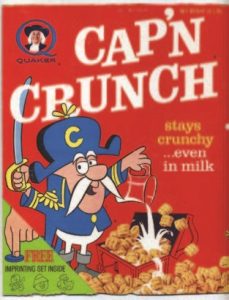 So let’s finish up with Cap’n Crunch. In terms of mouth feel, the folks who made this cereal really got me. Even as a pre-schooler, I understood that “staying crunchy even in milk” meant they would be super-crunchy right out of the box. (Only later did I begin to wonder why the word “even” was part of the sell copy; was someone pouring something else on their cereal?) Well anyway, they were sensational. Even now, I have to talk myself out of a date with the Cap’n every time I go to the store. For the record, I preferred the original, unadulterated version, without the Crunchberries and all the stuff they’ve added since. I’ll bet there are a dozen different Cap’n Crunch flavors right now. I should state here that I don’t eat Cap’n Crunch anymore and haven’t had a handful probably since the 1980s. It’s not because they are too sweet (which they are) or too crunchy (which they aren’t) or that the insane sugar rush one experiences while consuming them would have enabled Jean LaFoot’s fellow Frenchmen to hold the Maginot Line. I think it’s about how Cap’n Crunch affected the way I viewed my father.
So let’s finish up with Cap’n Crunch. In terms of mouth feel, the folks who made this cereal really got me. Even as a pre-schooler, I understood that “staying crunchy even in milk” meant they would be super-crunchy right out of the box. (Only later did I begin to wonder why the word “even” was part of the sell copy; was someone pouring something else on their cereal?) Well anyway, they were sensational. Even now, I have to talk myself out of a date with the Cap’n every time I go to the store. For the record, I preferred the original, unadulterated version, without the Crunchberries and all the stuff they’ve added since. I’ll bet there are a dozen different Cap’n Crunch flavors right now. I should state here that I don’t eat Cap’n Crunch anymore and haven’t had a handful probably since the 1980s. It’s not because they are too sweet (which they are) or too crunchy (which they aren’t) or that the insane sugar rush one experiences while consuming them would have enabled Jean LaFoot’s fellow Frenchmen to hold the Maginot Line. I think it’s about how Cap’n Crunch affected the way I viewed my father.
My dad piloted bombers during World War II and attained the rank of captain. That’s pretty much all I knew about his military service as a a little boy. He didn’t talk about the war much, or what it was like to fly or even be a leader of men. The only story he liked to tell was about how he and a buddy were ordered to “police-up” a stretch of beach in Savannah as punishment for some minor transgression committed during flight training. They raked the debris into a large pile before realizing that they had no way of transporting it to the dump. Their ingenious solution was to soak the trash with aviation fuel, toss a match on the whole mess and get back to more pressing matters. The resulting explosion propelled them through the air, singed off their eyebrows and convinced everyone within a couple of miles that either a plane had crashed or some saboteurs were up to no good on the beach. My father would tell me this story whenever he was igniting charcoal for a summer barbecue—usually after
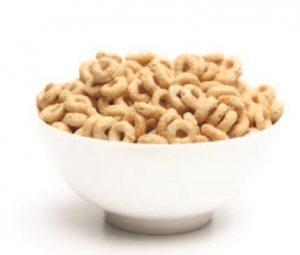
www.istockphoto.com
downing a couple of beers, with an open can of lighter fluid in his hand and a lit cigarette dangling from his lips.
At some point I made the connection between my father the Captain and Cap’n Crunch. I was five or six but I wasn’t an idiot. I recognized that Dad had been in the Army and, clearly, the Cap’n was a Navy man. But with their rank being identical, I began to question how and where my father’s military career had gone off the rails. He was by this time a newspaper editor, a job that was difficult for me to comprehend since I had only recently begun to read. (If he had edited Good Night, Moon obviously that would have been different). All I knew was that he didn’t have a big blue hat. He wasn’t on TV. He didn’t have his own ship. And he didn’t have his own cereal. What exactly had happened? Was it the garbage explosion in Savannah? Oh, my God. Was that what the barbecue story was really all about?
One morning I summoned the courage to confront my father at the breakfast table. He was consuming something unspeakable like liver and onions while I was fussing nervously with my bowl of Cap’n Crunch, moistened as usual with a half-ounce of milk. Without saying a word, I slid the box slowly to his side of the table. He looked at it for a long time, long enough so I knew I could open my line of questioning: “How come you were a captain and he’s a captain—”
My father tipped the box over so we could both see the front, pointed to the apostrophe in the top word and like an ex-officer and good editor, showed me something I had missed.
“He’s not a captain,” he pointed out in mid-chew. “He’s a Cap’n.”
His look said everything: Let us never speak of this again.
And sure enough, we never did.
Honesty, strength, generosity, and humor are qualities we look for in the people we admire and trust. They also happen to be the attributes that define Loretta Swit. After honing her craft on the stage for more than a decade, she was discovered by West Coast television producers and landed the role of Major Margaret Houlihan on the hit series M*A*S*H*—for which she would win a pair of Emmys—and then fought to give her character purpose and depth far beyond anything the show’s creators had imagined. A gifted child performer, Swit followed her dream across the river to New York and then across the country to Hollywood. As Gerry Strauss discovered, Loretta’s success was no accident, and her vision extends far beyond her role as an entertainer.
EDGE: What do you view as the qualities that took you to Hollywood?
LS: I would put courage number one. And confidence in my ability—my lust, if you will—to perform. Also, I was surrounded by some really lovely, talented teachers, and people who guided me and gave me support that fueled that confidence. Nobody in my environment made it to Hollywood, period. To announce you’re going to go into the theater was, like, no way. I’ve said in other interviews that I had no choice, that it came from the heart. But I’ve also come around to accept what other people [have called courage]. I think that it’s okay to know how brave you are, or how strong you can be. I think that’s a positive thing to know about yourself.
EDGE: Would you follow the same path from New Jersey to New York to L.A. if you were starting today?
LS: No. I don’t think I would have gone to California. Susan Taylor, my adorable and fun friend once said. “Don’t ever go to Hollywood without a contract in your hand. It’s a tough town.” I think that’s good advice.
EDGE: But you did, didn’t you?
LS: I always thought my career was on the stage. I never thought of myself as a film actress. But yes, a friend of mine, with whom I had done a play and who lived in California said, “Why don’t you come here for a week or two…and just, you know, spent a few weeks here? You never know. You might meet somebody who’d see you and says, Hey. you’d be right for this part.“ So I wound up at the office of the casting director for all of CBS—a very important lady, Pam Polifroni—and she was looking through my book and she said, “I know you. I know your name.” I insisted that she didn’t know me—I was a nobody! “Wait a minute,” she said, “there was an agent in here raving about your work. He went on and on about how good you were, and it impressed me.” She said his name was Fred Amsel and he was very laid-back and not at all pushy, even for his clients—and that he was so excited about me, even though I wasn’t a client. She promised to keep me in mind if something came up. I said, “I don’t live here.” She said, “Well, you never know.”
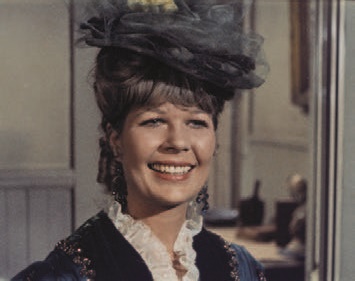
CBS Productions
EDGE: Did you call the agent?
LS: I did. I called him and he was a real Damon Runyon character. I don’t think he ever called me anything but “Kid.” We had lunch, he told me that in his agency he covered CBS and Paramount and that he would be happy to represent me. “If you’re willing to take a chance, I will get out there and talk about you in the district that I represent.” And it so happened that a part came up on Gunsmoke (left), which was CBS, which of course Pam cast. And so Fred called her and he said, “How about if I put Loretta for this part?” She said, “I think she’ll be very good in it.” I had to [audition] with some other people but I got the role. Fred called and said, “We got lucky!” I said, “I know. It’s great. It’s wonderful.” And it was a wonderful role and just a fabulous time. And a great beginning, because in those days, you really needed to have film on yourself to show people.
EDGE: What did the road from Gunsmoke to M*A*S*H* look like?
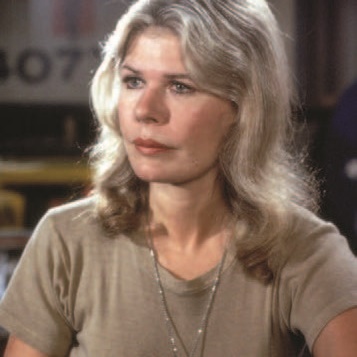
CBS Productions
LS: I was still filming Gunsmoke when they sent me over to Paramount to read for Mannix, which turned into my second job on television. Fred said, “We got lucky, again!” At that point, the three other agents in his office said, “This is looking very good. Let’s sign her.” And so I went with that office. Anyway, I was in Hawaii doing Hawaii Five-0—it was a gorgeous job—and Fred called and asked if I had seen the movie M*A*S*H* and I hadn’t. “Oh,” he said, “well, okay, terrific, it doesn’t matter, nevermind. You have a meeting with Gene [Reynolds] and Larry [Gelbart]. It’s just on you. There’s no script to read. So just go in, they’re gonna look you over, see if you’re what they have in mind for the part.” So, needless to say, I had no nerves. I was going to meet these lovely people. I didn’t know what I was about to lose or gain. I met my girlfriend before I went to the meeting and we went shopping and had a lot of laughs. In the meantime, Fred had an offer for me for a movie with Olivia de Havilland, and I was in disbelief. “The only thing is the dates of the filming conflict with the pilot for M*A*S*H*,” he said. “You can’t do both. However, this is an offer.” He said he would call [Gene and Larry] and tell them politely that, if they had decided on me, they have to move now. Gene Reynolds took the call, and said, “Nope, don’t give her away. She’s ours. We’ve just decided to go with Loretta.”
EDGE: Margaret Houlihan was a very complex character for a comedy series. Did you have any idea of where you wanted her to go in those early episodes?
LS: I was not the happiest of campers the first two or three seasons. I felt they were writing Margaret right but at the same time, she was entangled in a relationship with Frank Burns that was just beneath her. My character worshiped doctors and they were writing Larry [Linville] like a joke. Of course, he was so brilliant and funny and wonderful in that role, they weren’t going to change that. It was a given to keep Larry on that train. Alan [Alda] said it best: “As a writer, when you get a wonderful gimmick that’s working, that’s giving you all you want, like Frank Burns and Houlihan—who were funny and ridiculous and marvelous—it’s difficult for the writer to let go.” We’ve got a winner here. Don’t tamper with it. If it’s not broken, don’t try to fix it. In the meantime, my character was being assassinated.
EDGE: How did you advocate for Margaret?
LS: In the beginning years, when I didn’t know we would go for 11 seasons, I would talk to Gene Reynolds and he would say, “It’s episodic, sweetheart.” I’d say, “Yeah, but I feel like I’m going back and forth. In one episode, I see what an idiot Frank is, and you helped me with a line. But in the next episode, it’s like nothing ever happened. I haven’t learned anything…my character is not allowed to continue to grow and it’s making me crazy.” Little by little, Gene and the writers tried to talk to me. The guys were writing for the guys at that point and the guys were writing for Margaret, too. Gelbart was very, very aware of what was lacking in the first season. He said, “Hang in with us, we’re working on where she’s going.” In year two, I think, they had the wonderful idea to hire two women to write a revealing episode for Margaret. But again, in the following episode—no, no, no!—it’s like it didn’t happen. I kept plaguing them for help. Finally, I was in New York doing a play on a hiatus and the boys got together and we had a conference call, during which we ripped everything apart. They asked, “What do you see? Where is she going? What do you see for the next season coming up?”
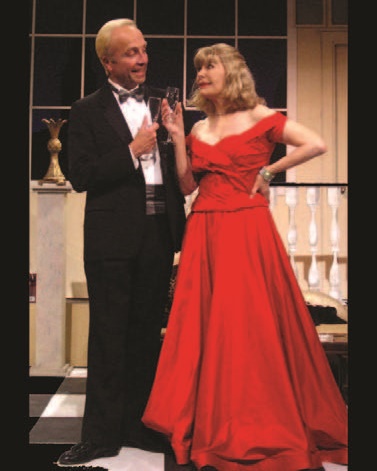
Photo courtesy of Loretta Swit
EDGE: What was your answer?
LS: She’s got to break up with Frank.
EDGE: Wow.
LS: “She’s got to leave him,” I said. “She’s got to go to Tokyo and meet somebody dashing and wonderful. I don’t care if he’s goofy and funny— because they have to be—but he doesn’t have to be a doctor. And he can outrank Frank, because that’s very important to Margaret.” They asked, then what? And Gene said, “Let’s get her engaged.” So we had this incredibly creative, wonderful, funny conversation where Margaret gets married and then finds he’s been disloyal and then gets divorced. There were a lot of good tracks to cover in those ideas, which we did. We really worked together like a well-oiled machine—everybody on this show worked together with the writers. Those Mondays were like fireworks. You had these creative people, throwing ideas back and forth in positive, wonderful, rich ways. It was a very exciting time to be around, to be an actor in that situation. You could not help but get better and grow and learn. It was just tremendous.
EDGE: Major Houlihan changed the way a lot of people looked at nursing during that era. Was that something you were aware of during the series?
LS: I don’t think so. It was only in retrospect that I see how strong the effect was. So many people have told me they became nurses because of me, because of Margaret. Television is so powerful. It can do so much good. It’s amazing. When we began, I said to Gene, “I want to play her like the best damn nurse in Korea. That’s what she wants to be and that’s what she is.” Again, you see how that played into my fight to get away from Frank Burns and the relationship, which in a way degraded her. He was an incompetent doctor, and so what was she doing there, when staying in that relationship any longer made it impossible for me to be the best damn nurse in Korea? I feel from that moment on, Margaret started to blossom and grow. She was flawed, like we are all flawed, but she’s a great example for nurses, for a head nurse and for the military.
EDGE: Obviously, M*A*S*H* also changed how doctors were portrayed.
LS: It did. You know, up until M*A*S*H* the doctors on television didn’t lose patients. They always pulled them through. That’s nice, but it’s not honest. We used to say that M*A*S*H* is not a John Wayne movie about war. In our series, people died, patients died, people got wounded and hurt. And we never stop talking about the ugliness of it. The humor came out of our own madness and craziness to have to be there to do that. The only way to survive was by being crazy and funny and drunk. I think M*A*S*H* took on cult status because we told everybody the truth.
Animal Alliance

www.istockphoto.com
Loretta Swit has leveraged her success and fame to the great benefit of myriad causes, from battling homelessness to advocating for emergency medicine to animal rights. She also devoted two months of her life to the recovery efforts after 9/11. Her charity, the SwitHeart Animal Alliance (switheart.org), promotes and cooperates with nonprofits dedicated to protecting, rescuing, training and caring for animals and preserving their habitats.
“The operative word is alliance,” she says. “There are a lot of wonderful people out there who are on the same page doing good. We’ve been very successful working together. For example, Mission Canine just brought back nine dogs from Kuwait with PTSD and we’ll be taking care of them at our camp in Houston. We’re also working with shelters to train service dogs, and search and rescue dogs, which can be deployed to disaster areas all over the world. We kind of cover every sphere—the aim is to get all of these people working together toward the same purpose and goals, to make some changes and to make a difference in a very positive way. They’re all incredible people.”
EDGE takes you inside the area’s most creative kitchens.

Grain & Cane Bar and Table • Grilled Salmon Tikka with Herb Salad
Grain & Cane Bar and Table • Grilled Salmon Tikka with Herb Salad
250 Connell Drive • BERKELEY HEIGHTS (908) 897-1920 • grainandcane.com
Scottish salmon marinated in yogurt, spices and flash grilled. Served with a tossed salad of tender herbs, pickled onion and a light citrus vinaigrette. A beautiful early winter dish that has a warm spice finish and pairs beautifully with a light red wine.

The Thirsty Turtle • Pork Tenderloin Special
The Thirsty Turtle • Pork Tenderloin Special
1-7 South Avenue W. • CRANFORD (908) 324-4140 • thirstyturtle.com
Our food specials amaze! I work tirelessly to bring you the best weekly meat, fish and pasta specials. Follow us on social media to get all of the most current updates!
— Chef Rich Crisonio

The Thirsty Turtle • Brownie Sundae
The Thirsty Turtle • Brownie Sundae
186 Columbia Turnpike • FLORHAM PARK (973) 845-6300 • thirstyturtle.com
Check out our awesome desserts brought to you by our committed staff. The variety amazes as does the taste!
— Chef Dennis Peralta

The Famished Frog • Mango Guac
The Famished Frog • Mango Guac
18 Washington Street • MORRISTOWN (973) 540-9601 • famishedfrog.com
Our refreshing Mango Guac is sure to bring the taste of the Southwest to Morristown.
— Chef Ken Raymond

Arirang Hibachi Steakhouse • Pork Belly Bao Buns
Arirang Hibachi Steakhouse • Pork Belly Bao Buns
1230 Route 22 West • MOUNTAINSIDE (908) 518-9733 • partyonthegrill.com
Tender pork belly, hoison sauce and pickled cucumber served on a Chinese bun.

Daimatsu • Sushi Pizza
Daimatsu • Sushi Pizza
860 Mountain Avenue • MOUNTAINSIDE (908) 233-7888 • daimatsusushibar.com
This original dish has been our signature appetizer for over 20 years. Crispy seasoned sushi rice topped with homemade spicy mayo, marinated tuna, finely chopped onion, scallion, masago caviar, and ginger. Our customers always come back wanting more.
— Chef Momo

Garden Grille • Beet & Goat Cheese Salad
Garden Grille • Beet & Goat Cheese Salad
304 Route 22 West • SPRINGFIELD (973) 232-5300 • hgispringfield.hgi.com
Beet and goat cheese salad with mandarin oranges, golden beets, spiced walnuts, arugula, with a red wine vinaigrette.
— Chef Sean Cznadel
LongHorn Steakhouse • Outlaw Ribeye
LongHorn Steakhouse • Outlaw Ribeye
272 Route 22 West • SPRINGFIELD (973) 315-2049 • longhornsteakhouse.com
Join us for our “speedy affordable lunches” or dinner. We suggest you try our fresh, never frozen, 18 oz. bone-in Outlaw Ribeye—featuring juicy marbling that is perfectly seasoned and fire-grilled by our expert Grill Masters. Make sure to also try our amazing chicken and seafood dishes, as well.
— Anthony Levy, Managing Partner
Outback Steakhouse • Bone-In Natural Cut Ribeye
Outback Steakhouse • Bone-In Natural Cut Ribeye
901 Mountain Avenue • SPRINGFIELD (973) 467-9095 • outback.com
This is the entire staff’s favorite, guests rave about. Bone-in and extra marbled for maximum tenderness, juicy and savory. Seasoned and wood-fired grilled over oak.
— Duff Regan, Managing Partner
Arirang Hibachi Steakhouse • Japanese Taco
Arirang Hibachi Steakhouse • Japanese Taco
23A Nelson Avenue • STATEN ISLAND, NY (718) 966-9600 • partyonthegrill.com
Choice of Tuna with wakeme, Kobe beef with sushi rice or Rock Shrimp with pineapple. Served in a crispy wonton shell, Asian slaw, topped with spicy mayo and teriyaki sauce
Ursino Steakhouse & Tavern • House Carved 16oz New York Strip Steak
Ursino Steakhouse & Tavern • House Carved 16oz New York Strip Steak
1075 Morris Avenue • UNION (908) 977-9699 • ursinosteakhouse.com
Be it a sizzling filet in the steakhouse or our signature burger in the tavern upstairs, Ursino is sure to please the most selective palates. Our carefully composed menus feature fresh, seasonal ingredients and reflect the passion we put into each and every meal we serve.
Do you own a local restaurant and want to know how your BEST DISH could be featured in our Chef Recommends restaurant guide?
Call us at 908.994.5138
These Are the 10 Greatest Pitchmen (and Women) of All-Time…
 Jack Benny
Jack Benny
Benny’s shameless incorporation of his sponsors’ products and jingles into his highly rated programs became a brilliant and highly profitable running joke.
 Stephanie Courtney
Stephanie Courtney
Courtney, who came to the ad world from improv comedy, has played Flo the Progressive Lady for more than a decade.
 George Foreman
George Foreman
A boxing villain during his prime, Foreman “unretired” in the 1980s, somehow regained the world heavyweight title at age 45, and reinvented himself as a friendly teddy bear who sold countertop grills, mufflers, invention services—you name it.
 Arthur Godfrey
Arthur Godfrey
In the 1940s and ’50s, Godfrey ranked as the most-trusted pitchman in radio and television, hawking everything from Lipton Tea to Chesterfields. After being diagnosed with lung cancer, he became a prominent anti-smoking advocate.
 Lori Greiner
Lori Greiner
When Greiner isn’t sparring with her Shark Tank peers, the Queen of QVC develops and promotes the products and companies populating her consumer-shopping empire.
 Joy Mangano
Joy Mangano
Mangano changed the home-shopping game when she muscled her way onto the air to promote her Miracle Mop and sold 18,000 in a half-hour spot.
 Peyton Manning
Peyton Manning
The self-effacing NFL legend has become so skilled as a pitchman that viewers actually turn up the volume when his laugh-out-loud commercials air.
 Billy Mays
Billy Mays
Mays took high-volume, high-octane pitches to a new level—particularly in the cleaning category—before a heart attack ended his life at 50.
 Shaquille O’Neal
Shaquille O’Neal
Shaq, who spent his boyhood in Newark, has found the sweet spot between silliness and seriousness to become a high-value spokesman for everything from Gold Bond to Papa John’s to Carnival Cruise Lines.
 Ron Popeil
Ron Popeil
Popeil is remembered for inventing and selling a relentless stream of products you didn’t need or really even want, yet couldn’t resist buying—from the Pocket Fisherman to the Showtime Rotisserie to Mr. Microphone to GLH-9 (aka hair in a can).







